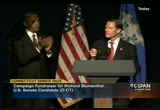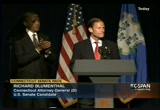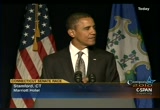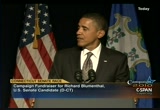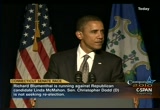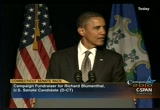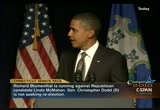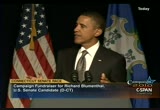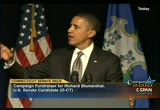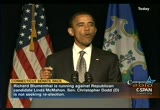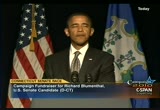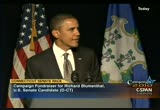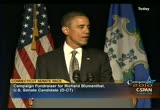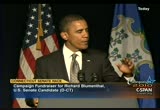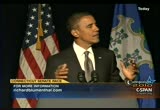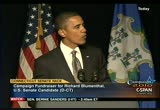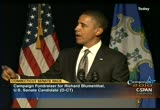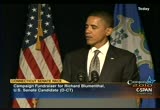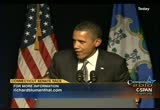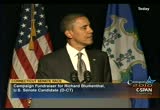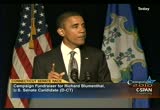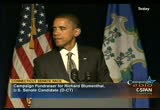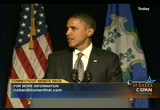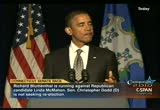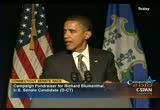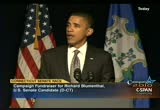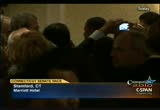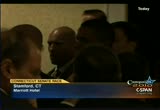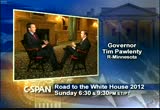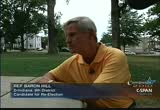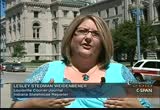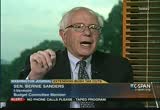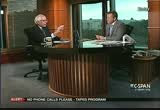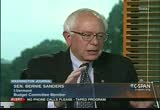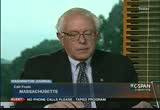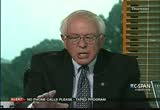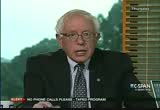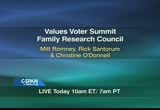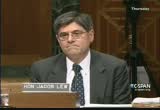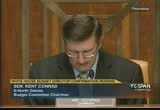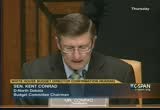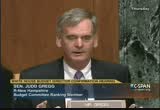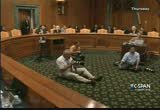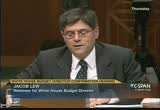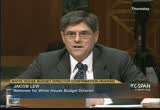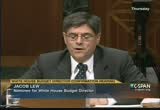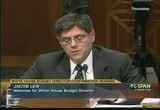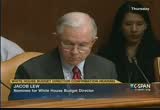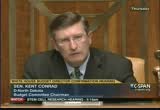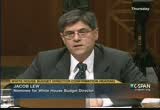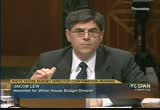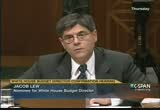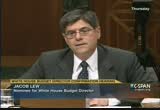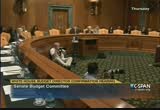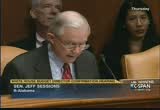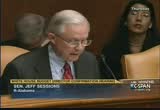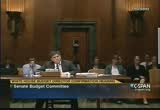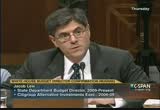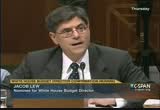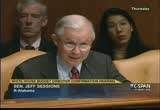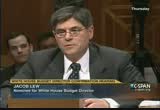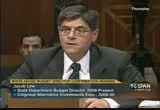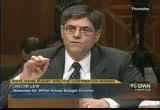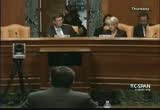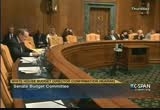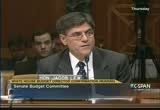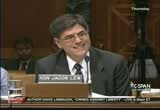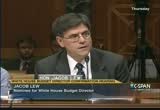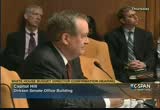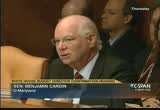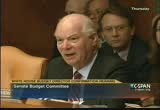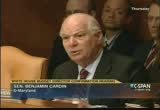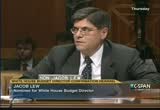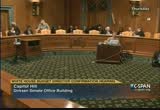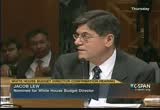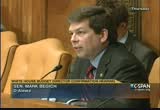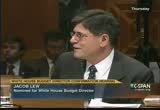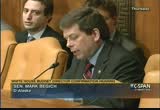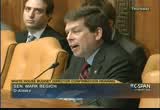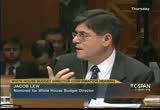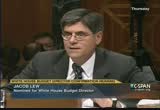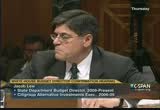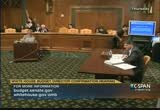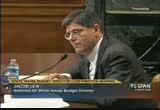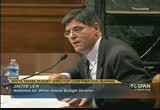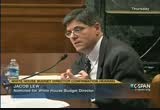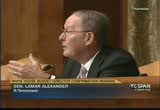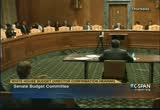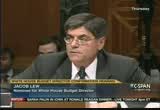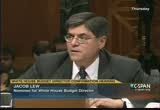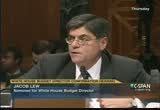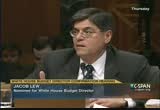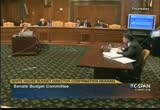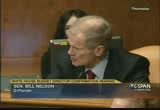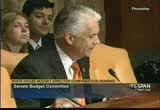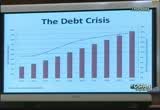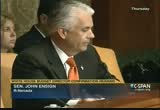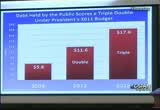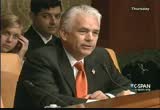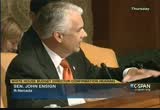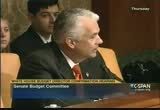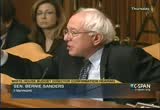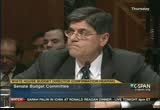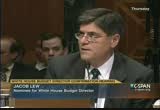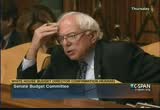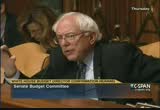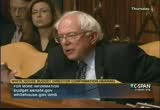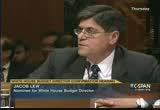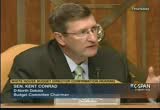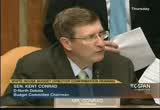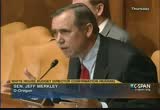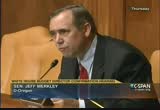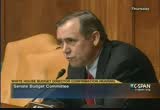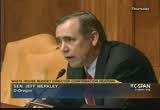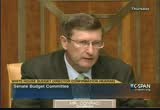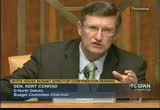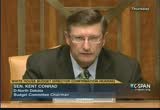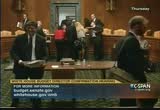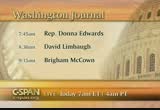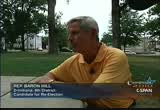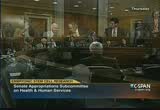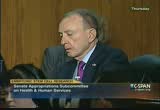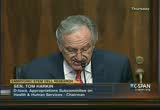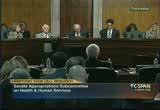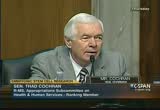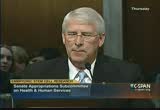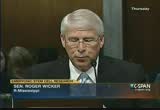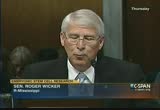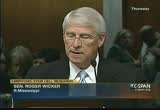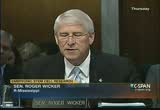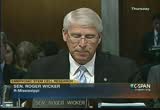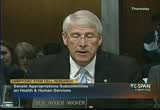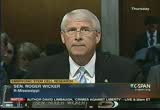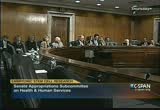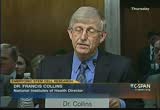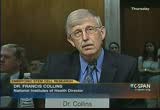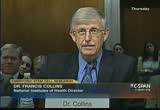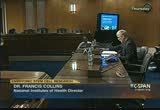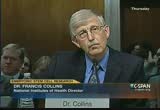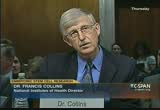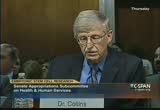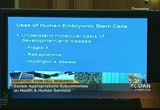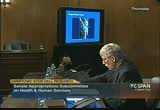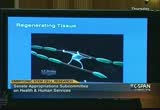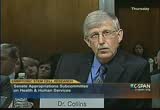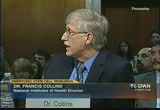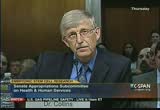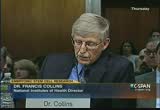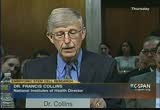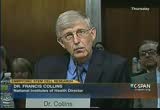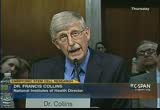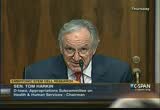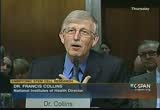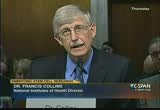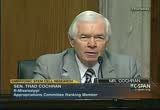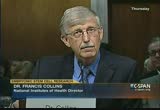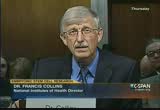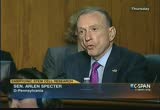tv Today in Washington CSPAN September 17, 2010 2:00am-6:00am EDT
2:00 am
an opauction. [applause] this seat is not for sale. the people of connecticut want a fighter, someone who will stand up to the special interest in the fight for their interest but that is what i'm going to do if i am lucky enough to have this job with your help. we all know that this nation face unprecedented challenges across. . .
2:01 am
2:02 am
[applause] >> thank you. thank you, everybody. thank you very much. thank you so much. gerd thank you. have a sea. reagan -- have a seat. it is good to be back in connecticut, and it is an honor to stand here with your attorney general and the next senator from connecticut -- nick lowenthal. i also want to acknowledge your candidate for governor, dan malloy. [applause]
2:03 am
you cannot be in one place too long. i also want to say thank you to cynthia and the kids for lending tadick to connecticut ad to the country. it is hard to be the spouse of a candidate and the spouse of an attorney general, and it will be tough to be a spouse of a senator. i promised i would not let michelle talk to him. the fact that david and matthew and clare are doing so well is a testament to mom, so please give her a round of applause.
2:04 am
thank you so much. this decision in this election is a no-brainer. it is simple. it is simply a no brainer. here you have got a man who has been fighting for the people of connecticut since the day he walked into office. he has the record to prove it. he held stock those companies from targeting our kids. he has taken on utility companies and tried to beat back utilities increases. he has taken on the auto industry to help keep family dealerships open that have been around for almost a century. there is no find -- no 52 big or
2:05 am
2:06 am
just in case there is any confusion. i understand she has promised a smack down. i could think someone would think they are right at home in the united states senate if they were watching some of the behavior that has been going on. the truth is the public service is not a game. we have seen challenges we have not seen since the great depression, and facing serious
2:07 am
challenges require serious leaders, leaders willing to take on the status quo and special interests, leaders willing to fight for our people and our future, and dick lowenthal -- blumenthal is that later. that is your choice in this election puree yen i want to give you a sense of the context, what is at stake. for the last decades, there was a specific philosophy that reigned in washington. you cut taxes for millionaires and billionaires. you cut regulations for special interest. you cut side on investments in
2:08 am
clean energy and research and technology. the idea was if we put line phase in the market, if we let everybody fend for themselves, somehow america would grow and prosper common and and over the last 10 years, the philosophy -- would grow and prosper, and over the last 10 years the philosophy has not worked so well. it did not work for an economy that experienced the slowest job growth since world war ii. this was before the financial crisis. it did not work when a record surplus turned into a record deficit. it did not work when the recklessness of someone to the worst economic crisis since the great depression, so i ran for
2:09 am
president because i had a different idea about how this country was built. it is an idea rooted in my own family store. my family never had much. they worked tirelessly so i might have a better life. they believed in american values of self-reliance and individual responsibility, but they also believed in a country that rewards hard work, a country that rewards responsibility, a country where we look after one another. they believe in the america that gave my grandfather the chance to go to college because of the g.i. bill, an america that gave the chance to buy a home. an america where a rising tide really does lift all votes, from
2:10 am
the ceo to the newest guy on the assembly line. we do not think the government has all the answers to our problems. we do not think role is to create jobs or prosperity. we believe government should be lean and efficient, but in the words of the first republican president, abraham lincoln, we also believe the government should do for the people what they cannot do as well for themselves common -- as well for themselves. [applause] that means it should invest in our common future. it means the powerful special interest corporations that need to live up to their responsibilities. it means government should help make the middle class more secure and give ladders to climb
2:11 am
into that middle class. that is what we believe. that is the future we see. we see a future where we encourage american ingenuity and that is where we want to end tax breaks for companies that ship people overseas and give that to people hiring right here in the united states of america. that is why we are investing in research and technology and the home grown clean energy industry, because i do not want to see new solar panels or electric cars, advanced batteries manufactured in europe or asia. i want to see them right here in america with american workers. we see an america where every citizen has the skills to compete with any worker in the
2:12 am
world. today at had a meeting with 100 ceos who are partnering with the department of education and our national science foundation to improve math and science training in schools, because we need more engineers and scientists. that is how we are going to keep cutting edge. that is why we will have the goal of the highest college graduates by 2020. we used to be number one. we are now no. 12. we are going to get back to no. 1 by the end of the decade. that is why we're revitalizing community colleges and reforming our education system based on what works, not is -- not on what is status quo. that is why we're fighting to make permanent our new tax credit.
2:13 am
that will mean $10 million for tuition relief for each child going to -- $10,000 for tuition relief for each child going to college. we see an america where the middle class is the bleeding heart of the economy. that is why we passed health insurance reform to stop insurance companies from jacking up your premium, then drop coverage when you are sick or have a pre-existing condition. that is why we passed financial reform, to end taxpayer bailouts. to stop on wall street banks from taking advantage of the people. we want to compete on service, on good products and good prices. that is why we are trying to
2:14 am
make it easier for workers to pay for retirement and fighting efforts by some parties for social security, because the phone if i am president, no one is offering to take the retirement savings of a generation of americans and -- because as long as i am president, no one is offering to take a retirement savings of a generation of americans and gambling them on the economy. we have been through an incredibly difficult time as a nation. nacents i never imagined when i walked into the white house, preventing a second impression would be at the top of my to do this. even though we have done that, even though the economy is growing again, near -- there is no doubt that because of all is so deep, progress has been
2:15 am
painfully slow. millions remain unemployed. millions more can barely pay the bills. hundreds of thousands of families have lost their homes, and behind each as the story of heartache and struggle, and i read about that heartache and struggle in letters i receive every single night and whenever i am traveling around the country. i know they are anxious about the future. i also know in a political campaign, the easiest thing for another side to do is to try to ride that anger and fear to the election day, especially when you have millions of dollars you can burn to reagan that is what is happening now. it would be one thing if reaching millions of dollars you can burn. that is what is happening. it would be one thing if they looked back and said, our politics did not work really well. they screwed up, and they went away and meditated.
2:16 am
they contemplated and finally said, everything we did ended up in a terrible recession. they came back and said, we're going to propose something different. this time and we think we have got the answer. they are not offering any new ideas. i would challenge anybody to name a single new idea they are putting forward. they do not have one. they are not offering new policies. the chairman said if a takeover congress, they will pursue the same agenda as we did before i took office. they pursue what they say are the exact same policies. here is what it comes down to. these folks spent a decade driving our economy into a
2:17 am
ditch. we took office. we put on our boots. we climbed into the ditch. there was money, above, -- bugs, and we are slipping and sliding. the republicans are standing there, sitting on a slippery, watching us, saying, -- sipping on a slirpy, watching us, saying you are not pushing hard enough. we say, come help me. we could use at hand. the survey. -- that is ok. finally, after two years common -- after two years, we get back
2:18 am
on the road, and we can see the way forward, and we get a cab on our shoulder, and we turn around, and it is a republican, and they say, can we have it back. -- have the keys back? no, you cannot have the keys back. you do not know how to drive. . -- you do not know how to drive. you cannot have the keys. [applause] [laughter] it is not just them.
2:19 am
all those special interests are lining up. yes, we're going to ride shotgun. we cannot give them the keys back. have you ever noticed, if you want to go forward in the car, you put your car in d, and if you want to go backwards, you put it in r. you end up in the ditch. it is true. using that is a coincidence. -- you think that is a coincidence. if we give them the keys back, they want to go back to the days when credit card companies can jack up your rates, insurance companies can deny you coverage because you got sick. they want to stand by and do nothing while they lay off teachers and fire fighters and
2:20 am
cops, because according to members of the house, those are government jobs, apparently not worth saving. they want to give tax breaks to companies that ship jobs overseas instead of investing in the united states. they want to borrow $700 billion to get a tax break worth an average of $100,000 to every millionaire and a billionaire in america. these are the people who lecture us on fiscal responsibility, the same people who refuse to pay for two wars, a reader who pay for two wars, two tax cuts -- the same people who pay for two wars, two tax cuts on the wealthiest americans, and they want to spend another $700,000,000,000.97% of americans -- $7 billion that 97%
2:21 am
of americans will never see. that is what they are offering the american people -- a future that looks just like the past. one were middle-class families are left to fend for themselves. that is not a future i except for the united states of america. that is not a future nick leventhal -- blumenthal accepts. people are hurting and are frustrated. a lot of them are anxious, and that means even when people do not have ideas, if they have enough money behind them, they may be able to convince some folks to cast a protest vote.
2:22 am
that is a mentality that has an appeal, and you cannot blame folks for feeling that way sometimes, but that does not a future for our country, a country that is more divided, more unequal, less dynamic, where we are falling behind in everything from investment in infrastructure to research and development. that is not a vision for the future common -- for the future, and if the does not the future you want for your kids and grandkids, then we are asking you for help in this election, because i want you to consider this. all across the country, special interests are planning and running millions of dollars against the democratic candidates common retake the democratic candidates.
2:23 am
they are able to spend as much as they want. millions of dollars, and the group's -- americans for prosperity. who is against that? moms for motherhood. i made that up. none of them will disclose who is paying for that adds. you do not know if it is a big oil company, and insurance company, or foreign entity. in some cases, they are spending more than the candidates. they want to take congress back and return to the days were lobbyists wrote the laws.
2:24 am
that is happening right now, so there's a lot of talk about populist anger and grass roots, but that is not what is driving a lot of these elections. we tried to fix this, but the leaders of a lot of parties would not even, for a vote. they want to serve special interests that served them so well. we will not let them. we are not allowed to -- about to allow corporate takeover of our democracy. we are not going back to the days of special interests. we are not going back to the days when insurance companies wrote rules set let you languish without health care because you had a pre-existing condition.
2:25 am
we are not going to go back to the same agenda we had when i took office. it is still fear verses " -- versus hope, and it is a still a choice between backwards or forwards. i need you to knock on some doors. i need you to talk to your neighbors for dick blumenthal. if we need you to do this for candidates all across the country, because the only way we will match is if we have millions of people making their voices heard, and none of this will be easy. it is going to be hard, but you did not elect may to do what is easy. you re-elect us to do what is right.
2:26 am
2:28 am
2:32 am
♪ >> for anyone else considering continuing in public service, the question is to you have a vision for the direction the country should have, and you have a demonstrated experience that shows you can get it done? >> tim: dave reeder tim -- tim pawlenty, sunday on c-span. >> local content vehicles are traveling the country as we look at some of the most closel house races. >> there are only a certain number of seats that are highly
2:33 am
competitive, and they constitute good opportunities for republicans to pick up a seat in congress. >> it has always been a barometer of what is going to happen next with each party. that is why there is always a lot of interest. >> we have the democratic incumbent. he was first elected in 1998. it is a very interesting district. to glance at
2:34 am
to be homogenous, but there is quite a lot of diversity in terms of political thought, so you have an area in the northern part of the district. you have an area where people think of themselves as democrats. they seem to vote for republicans as president, and you have some areas along the river that our urban and suburban. those are areas that are always changing. the result is even though the area could be considered a democratic district, there are a lot of conservatives there. you are never sure how that is going to play out. one thing that makes it interesting is that it is actually covered by four
2:35 am
different media markets. the problem is none of them are a majority in the district. you're advertising dollars do not go very far. it is a very complicated place to run a campaign. >> what will make the difference in getting reelected? >> they were explaining some of the votes that were controversial. he said when he had the chance to explain to an individual voter why he supported the health care plan and what he believes that will mean for that individual, he thinks he can make a difference. the question is, will you have the money and the time were enough people will buy the
2:36 am
explanation. i say it is going to depend on the ability to raise money. it is a very difficult district in which to advertise. i hate to say it, but money is going to play i huge role. he had over $1 million. if tom young can keep up the momentum and you see some national group's common region -- groups come in, that is where it really matters. >> social security is not a huge
2:37 am
problem to correct. we're now at the time where we readjust again. those will not be forthcoming until december. we will fix social security. we need to keep it like it is and not privatize it. >> i lament the fact that congress has been so irresponsible but they spend our retirement money on everything but aren't near retirement. we got some of the central programs that need to be preserved. >> i can see social security is going to be a big issue in this
2:38 am
race, because there seems to be a difference between republicans and democrats. we are not far enough into it to see were the differences live. it is clear they are going to try to distinguish his opinion, and there is going to be a debate about whether privatizing social security is an issue. young is going to spend a lot of time bringing up past votes including support for the health care law and the cap and trade bill, which the governor highly opposed. there is going to be some debate about that. erin hill, although he is a blue dog democrat and is considered conservative, i would expect
2:39 am
todd young to spend a lot of time talking about the federal deficit. there are so few races were the districts are actually competitive. those are the places we always want to see what is going to happen. he did vote for some of the major things, but he is also a guy who is somewhat conservative. it is a test of how voters feel. >> seize the local content vehicles are traveling the country as we lifted some of the most closely contested house races leading up to the midterm election. for more information, go to c- span.org/lcv. >> now a conversation with
2:40 am
senator sanders. this is 35 minutes. host: joining us now is senator bernie sanders, an independent from vermont, who regularly caucuses with the democrats. are you fearful that harry reid will no longer be the democratic leader after november? >> there is a possibility of that happening -- guest: there is a possibility of that happening but i think the democrats will remain in the majority. i fear there are millions of americans, working people, who are so frustrated by the economic situation, under employee, lost their homes, and they will take their anger out on the party in power. i hope, in the midst of these economic difficult times, people think about how we got here in the first place. in my view, the republican, bush
2:41 am
policies were a disaster. let's not forget, the country was losing 700,000 jobs a month, the financial system was on the verge of collapse. in my view, have the democrats done enough to take on wall street? no, they have not. but it is important to remember how we got to where we are rather than punishing democrats for not moving more aggressively. bottom line, we cannot go back to the republican policies which caused the crisis. host: we have spent a lot of time this morning talking about the tea party movement. what are some of the bright spots you have seen, as far as conservatives go? guest: as far as progressives, guest: as far as progressives, there is a satisfaction, but i
2:42 am
would not be honest with you if i did not say, while many progressives are positive to president obama, there is a disappointment that he has not been as aggressive as he should have been, taking on big money interest. at the end of the day, what we have to understand is the middle class in this country is disappearing. property is increasing. the people on top are doing phenomenally well. that is the dynamic. we have the most unequal distribution of wealth -- and that is an issue that the democrats have to talk about. we know republicans will not address it. democrats have to protect the working people and take on wall street. host: an issue that you have
2:43 am
host: an issue that you have expressed views on in the past, consumer advocate to lead new watchdog agency. there are reports that elizabeth warren will be reported during -- as a recess appointment. guest: the reason people are so angry, they thought the greed, recklessness, illegal behavior on wall street -- and i use this word advisedly -- crooks, who were only interested in getting as much money as they possibly could. they sought a bailout, and they have not yet seen congress stand up to wall street, who by the way, has spent billions of
2:44 am
dollars on lobbying and campaign contributions. you can not continue to rip off the middle class and working families. you cannot charge family's 30% interest. we have to start breaking up these big banks. one of the strongest advocates for the banks, who have been most clear of the delineating what wall street has done, is professor elizabeth warren. i want to applaud the president for that. i have been pushing for her to get this position. if true, it will be the best applicant that he has made felipe calderon host: -- will be appointment that he has made.
2:45 am
they have a filibuster, filibustered. let's bring elizabeth warren's named to the senate so she can be defeated. that does not make sense to me. i am not sure how the president plans to appoint her, but i am happy he is doing it. host: tax cuts, lots of debate. in your view, how should they be handled, will it be in a lame- duck session? guest: i think there will be a caucus this afternoon that will make that decision. i think we should do it now. the u.s. has the most unequal distribution of income and wealth in the world. it is something that we do not talk about. we are in a situation where -- in the 1970's, the top 1% earned
2:46 am
8% of the wealth in the country. that number is three times that now. the top 1% earns 25% of the wealth in the country. interestingly enough, the top 1/10 of the top 1% holds 11% of the country's wealth. so people on top are becoming phenomenally well here, middle- class poverty increasing. my republican friends think it is a good idea, after they scream about the deficit, apparently, think it is a good idea to provide $700 billion to the top 2%. i think that is a dumb idea. this is what i think we should do. take that $700 billion, and instead of giving it to tax breaks -- and by the way,
2:47 am
millionaires would average $100,000 in tax breaks. instead, use half of it for deficit reduction, the other half for energy investment, infrastructure. we need to have jobs building our schools, roads, school systems, transforming the energy system. that makes a lot of sense to me instead of helping these corporations. host: you are a member of the budget committee. this is an article from yesterday's "wall street journal." it also says 45% of u.s.
2:48 am
households to not pay an income tax. guest: that is right. with all due respect, sometimes they do not get it right. that does not include fica taxes. everyone pays a payroll tax. the federal income tax has gone down. but here is the point to be made. when the top 1% earns more than the bottom 50%, we should not be surprised that it is the top 1% that pays more in taxes. but the reality is, we have lowered the effective tax rate for the top 1%. i think you have heard, warren buffett for example -- one of the richest people in the world -- has made the point that he makes an effective tax rate that is less than the policemen or firemen in his city.
2:49 am
to give tax breaks to the richest people in the country who already received significant breaks, at a time that we have a trillion dollar debt, makes no sense to me. it just speaks to the incredible greed of people on top with seem to want more and more for themselves and could care less about the rest of the country. host: you refer to your republican friends -- who is your favorite republican in the senate? senate? guest: there are a number on a number of committees. for example, i find lamar alexander to be quite pleasant. host: dan on the republican line, you are first. caller: i have a question regarding s.604. at some point, he decided to
2:50 am
water down that bill. i wonder if you believe it was your call to water it down before telling anybody about it -- you know, without devising another plan. guest: here is the story on that. i reached the judgment -- which i believe is the right one. so that people understand, i introduced legislation in the senate, and for the first time in the history of the senate, we would applaud it -- audit the fed. they are an enormously powerful organization who prints money, attacks the soundness of our financial system. financial system. -- insures the soundness of our
2:51 am
financial system. there was some language in their that passed to audit the fed. i think history prove me right, but we did not have the votes to pass the language. but what we did do it is get an audit of the fed on what people were most concerned about, the emergency provisions that were occurring over the past three years. the fed -- they lent out at year's zero interest loans over $2 million. for the first time, we are going to find out who those financial institutions were who received that money. we're also going to look at the conflicts of interest, that in my view, took place, between the fed, goldman sachs, a.i.g., and other large institutions.
2:52 am
the passage and inclusion in financial reform was a major step forward. we did not get everything we wanted, but a major step forward. host: this tweet for you -- host: this tweet for you -- guest: i agree. i voted for healthcare reform for a number of reasons. while it was, by no means, the bill that i thought the country needed, it was what we could get with virtually no republican support. i also worked hard to double the number of people who would have access to health insurance. we provided insurance for 30 million more people. i think what the tweeter is
2:53 am
saying is right. at the end of the day, we should have a system -- we have a system where private companies place such a prominent role. i do not want to shock people, but a private insurance companies highest priority is making money. i believe in a medicare, coverage for all-type of system. it would give states the flexibility of moving toward a single payer system, or other forms of health care that they would choose. host: robert. dinwiddie, virginia. caller: i have a couple of questions. i am just amazed at the amount of money that is being spent by the republicans -- of course,
2:54 am
the rich are behind it. the tv is full of ads and you have people out here who are well below the poverty line, and republican believe that they can save us all. save us all. the democrats do not do more to show us that we cannot go back to the old days -- $4 a gallon for gasoline. people had to do everything they could just to get back and forth from work. the republicans are spending so much money. i think we need a law that could regulate how much money can be pushed into that. guest: robert makes a profound statement, you're absolutely
2:55 am
right. what we are seeing now, and especially because of the citizens united supreme court decision, is people are upset because of the money that is being spent. large corporations and wealthy individuals are not content with the money that they have so they are using it to deeply influenced the political process. we are talking about huge amounts of money. correct me if i am wrong, but i think we will see double the amount of money going into campaigns this campaign, than in the last. many of those commercials will be funded by large corporations, some by foreign- owned corporations. clearly, robert is right. big money is playing a huge part. that is bad for not only the
2:56 am
democrats, but that for democracy. it should not be based on who has the most money. host: another tweet from twiggy -- guest: i do not know about that, but there is no question, wall street has influenced both political parties. i am an independent. having said that, the evidence is pretty clear, we have almost no republicans, in terms of financial reform. the democratic bill, in my view, did not go as far as it should have, but they attempted to do something. if the caller is suggesting that wall street -- which by the way, in that time of deregulation,
2:57 am
spent billions of dollars to lobby campaign contribution -- and you are right. host: senator sanders is a graduate of the university of chicago. how did you get there? guest: i went to brooklyn college for one year. i wanted to get away from home. i was able to get some financial assistance, and enjoyed it very much. host: you are not the typical university of chicago student. massachusetts. barbara, on the democratic line. caller: i am calling to suggest a fix to the session -- social security system for the upper income individuals who do not need the money. any social security recipient could choose to set up a legacy account where they could transfer their social security quarters to one of their
2:58 am
children, relative, maybe even to a charitable organization. maybe as a sweetener, they could take that volume dollars each year as a charitable contribution. at least evidence that it would be happening. we all get these statements that show what our payout will be. you could see those numbers on your statement. guest: an interesting idea. let me be as clear as i can. you are hearing every day from the right wing that social security is going bankrupt, we need to take steps, maybe privatize it, maybe raise the retirement age. let me say unequivocally, social security is not going that -- bankrupt. according to the congressional budget office, social security
2:59 am
can pay out every benefit code to every eligible american or the next 29 years without going bankrupt. at that point, it will pay 80% of the benefits owed to eligible americans. what is the solution? what is the solution? it is a solution that president obama mentioned in his campaign. right now, if you are a multimillionaire and you make $100,000 a year, you pay the same amount into the fund. if you lift that cap up to $200,000, the problem could be solved. i believe there is opposition to social security is because this plan has worked. it has cut back on expenses for the poor, take care of widows. despite terrible economic times, social security has paid
3:00 am
out $1 on the dollar of what people were entitled to receive. it is working, let us not dismembered it. host: the number of newly laid- off workers seeking unemployment benefits dropped slightly last week, a sign employers are cutting fewer jobs. the labor department says unemployment benefits declined while many expected an increase. louisiana. james, go ahead. caller: first of all, i am retired air force. i am very displeased with the republicans right now because they are not working with the democrats. they are all supposed to be supporting the people but they are deliberately tried to take
3:01 am
care of their companies because that is where they get their campaign contributions. it is hurting the country and is only making that 1% rich. it is good if you guest: i agree with james. here is the point -- i want everyone to appreciate that when you turn on the news networks, you do not hear this discussion. why is it we do not hear discussion about the growing gap between the very, very rich -- the top one-tenth of 1% and earns 11% of the income. we do not hear it because the rich are doing very well and what to protect that situation. what to protect that situation. i think that james' point is absolutely right. i think the republicans sadly
3:02 am
have played an obstructionist role, heavily down more filibusters in the past two years the and i believe that any time in the history of the u.s. senate. senate. they have been declared they are intent on winning elections not with regard to addressing very serious issues. we can have disagreements. we can have disagreements. it is a democracy. but republicans said not simply be saying no, no. -- should not simply be saying no. caller: thank you for c-span, and thank you for bernie sanders for lobbying for clean water in washington, d.c. -- i talked to him on the elevator once. i am a retired union, under from wayne county. many people do or don't know
3:03 am
that west virginia and is being destroyed by mountaintop removal mining. about 90% of it is owned by corporations either outside the state or the country. we are one of the wealthiest states in the u.s., and at the bottom of every list. that is as far as median income, education level, poverty. we are at the top of every list of the worst. we have lots of natural resources being extracted, but we receive no benefit. both our democratic party, and the republican one here are both owned by corporations. we have a u.s. senate race occurring now between our current gov. joe mentioned, and a wealthy businessman and out of the northern part of the state. if you put them in a bag and pull the not, you could not tell which is which. host: we will leave it there.
3:04 am
guest: joe said a lot, but his last point about there not been enough difference between democrats and republicans, and both heavily influenced by big money -- no question that democrats should do more for the middle-class than republicans ever did. having said that, if you only having said that, if you only think about the 1930's when fdr became president, he was prepared to say boldly but he would stand with the working class of america and take on what he called the economic loyalists -- those repeople who were exploiting workers all over america. when your party who can get rid of corporate money to misting of working people. get small campaign donations, y that willldly sat
3:05 am
take on a private insurance companies, and in the drug companies, and military industrial complex. host: what is one of the issues currently in vermont, you are focused on an index guest: a number of them, one is probably end. vermont is one of those rural states -- one issue is broadband. we have communities that don't yet have strong internet ell phonens, or cal service. the only got a very generous grant through the stimulus package, well over $100 million. the other issue that we are
3:06 am
working on in vermont is that there is all lot of support for single-payer medicare system. i'm working to see that vermont becomes the first state and the country to provide health care to each person in a cost- effective way. host: is the yankee nuclear reactor still open? guest: it is. the state senate voted overwhelmingly bipartisan not to renew it. the owners are not happy about that. host: the next phone call, from the glendale, arizona. caller: the first of all, i am not a rich person by any means. however, what i want to know is, i find it shocking economy and
3:07 am
with your seemingly communist benches in the u.s. senate, and why you want to cause some kind of class warfare and condemn the rich? people can work card here to entertain something we can work hard here. a list in honduras a medical mission - i was there. host: we got your point. host: we got your point. guest: it is not nice to suggest that i am a communist. in most certainly not. i am a strong believer in democracy, not in authoritarian society. in vermont like other states we have elections. in 2006 iran against one of the wealthiest person in the state to spend much more money, and i defeated him 2-1. the people made their own decision based on the work cited
3:08 am
as a matter of the largest city, and within the senate. talking about class warfare, the you understand that it is taking place right now? i am not urging class warfare, but it is taking place. when large corporations shutdown plans an american ship jobs to china, in order to save money and for american workers out on the street, and leave them hanging, that is class warfare. the richest people in this country fight for huge tax breaks for themselves while middle-class village cannot afford to send their kids to college, that is class warfare. the wealthiest people in this country fly around in the private jets, have the best health care in the world, and 46 million americans have no health insurance at all, 45,000 americans died this year because they do not have access to a doctor -- kathy, that is called class warfare. when 25% of our kids are living on food stamps at the time the
3:09 am
top 1% earn 23 percent of income in this country, that is class warfare. so, class warfare exists rental end of 1% of class is winning the war. if you disagree with me, that is your privilege, but that is my view. host: senator bernie sanders, you have often been identified as a socialist -- are you? guest: in a democratic socialist, consistent with many democratic parties in western europe and scandinavia. i believe that we need a mixed economy where entrepreneurs create wealth and the but we use the government to make sure that everybody has at least a minimal standard of living. we are the only nation in the industrialized world today, and health care reform will take a step further, that does not guarantee health care to all people as a right of citizenship. if you go to but germany and scandinavia and ask the kids in those countries, to cost to go
3:10 am
to college -- know the answer? it is zero. if you give birth in europe, scandinavia, you get six months or eight months off. much more so than in the u.s. willing in terms of distribution of income, workers' rights, they do much better. what to meet democratic socialism is about is to said that every person in a society is intended to a least a minimal standard of living, and should not be living in a society where so few have so much. and so many have so little. host: the next phone call comes from a little early, texas -- wimberly. caller: of like to suggest that the previous caller what john c- span your august 29 town hall meeting to understand, that you are definitely representing your people, and you are a man of the
3:11 am
people. i agree with just about every sort of thing you have ever done or said -- bless you. you are a treasure. we are represented down here by cornyn and nutchinson. i am blessed to have lloyd dogged as are represented, and we will reelect him -- i like to pick up on what he said of belle clean water. we have a big problem with the privatization of water. people in our small community are paying revenue of just a flat rate to have water and sewer. the flat rate is $154 per month. guest: what? did she say it was $154 per month for whaater?
3:12 am
that is incredible. the point which is making is that corporate interests -- protested as a postal charges for the air breathed. these guns are all over the place, are not stopping. that is why we need a political revolution in this country where we need an elected officials who are prepared to do what is very difficult. we got a call earlier about the airwaves being deluged with campaign commercials before by the wealthy and large corporations. we need to let people who are prepared to take these goes on, and have campaign finance reform sublet billion years and large corporations cannot buy elections. host: senator bernie sanders, this is another message by twitter. twitter. guest: i agree.
3:13 am
host: the next call is from arkansas. caller: you're talking about the debate on whether to raise or keep taxes the same. my biggest deal is republicans or democrats, neither addressed the massive fraud associated disability among those younger than retirement age. i can ask at political events how many people know people who have draw disability illegally? everyone knows between 20 and 50 people. it is so rampant. guest: in the state -- host: you said everyone in branch, arkansas knows someone who draws disability? guest: i think there is a point
3:14 am
-- i think there is abuse and i think we should look at it. disability is there for the disabled, not for people to abuse it. host: a conservative twitterer -- [laughter] guest: a year that often in vermont. some said that back when you were running for mayor, and never voted for you. -- i hear that often in vermont. we did 13 town hall meetings in august. host: you can watch that in our video library. guest: it was great with all kinds of people. one of the issues that appeared
3:15 am
in nearly every meeting i did was the issue of trade, and loss of manufacturing jobs. when we talk about the decline of the middle class, we're talking about the fact we have lost millions of good-paying manufacturing jobs. people go to the store and it is hard to find a product manufactured in the u.s. one reason is a disastrous policy that s american workers to compete against desperate people in undeveloped countries to make only pennies per hour. to make only pennies per hour. we have got to change those policies and the that corporate america start to reinvest in this country. host: i got to control by referring to rockdots as a conservative person. another call, from california.
3:16 am
caller: i wanted to bernie to thank him. is a wonderful person, and i wish there more people like him. he sticks straight with no side talk. i'm very confused because the voted for obama, and i am a little disappointed because he seems to be afraid to do --i dove with him to be like bush, but my god, you must have to be, and so did the democrats -- they need to stand up. how can the republicans get away with it, and we cannot? guest: i will tell you, i hear this all over the place. people voted for the president, respectively immensely, won him to be tougher.
3:18 am
[inaudible conversations] >> this hearing will come to order. we are considering president obama's nomination of jacob lew to be the next director of the office of management and budget. i want to first welcome jet back to the committee. he is well-known and well respected by the members of this committee. i also want to welcome jack's family who are with him today including his wife, ruth and his daughter shoshana. we are pleased that they could be here as well. welcome. and we hope jack will introduce
3:19 am
them when he makes his opening statement. i am sure he will. as everyone knows in public service, we could not do our jobs without the incredible support of our families and we recognize and very much appreciate the sacrifice that the lew family has made in the previous assignments jack has had, including as head of the omb. i believe jack is a superb choice for this position. when i was asked by the white house my reaction i told them i don't think you could make a better choice than jack lew. not only has the art he served in this critical post and i'm so with real distinction, but he brings with him a wide range of public and private sector experience including his current position as deputy secretary of state for management and resources, which in itself is a challenging posting.
3:20 am
importantly, jack knows how to make the tough choices that will be needed to put our country back on a sound fiscal course. when he completed his service at omb, the country had a surplus of more than 200 alien dollars. jack knows how to reach across the aisle to find bipartisan agreement. he was hinged metal and putting together the 1997 bipartisan deficit reduction package that help create those surpluses. and jack has the highest integrity. anyone who has worked closely with him over the years knows that. he has repeatedly proven hiself to be an outstanding public servant. so jacob lew brings with him exactly the kind of knowledge, experience, but partisan spirit and integrity that we need at omb right now.
3:21 am
he is the ideal person to lead this critical agency. the economic and budget challenges facing the nation are great. in the near term we need to strengthen the economic recovery and promote job creation and at the same time, to address the nation's long-term fiscal crisis. we must begin now to put in place the deficit reduction policy that will kick in after the economy is on stronger footing. that is why the work of the president's bipartisan fiscal commission is so important. combining these policies of short-term job creation and long-term deficit reduction is no easy task but the fundamental economic security of the cotry depends on it. in these challenging times it is imperative that we have strong leadership at omb. i hope we can move quickly on this nomination. we can't afford to leave this position vacant at such a critical time.
3:22 am
it is my hope to schedule a committee vote on this nomination soon that the full senate has time to confirm the nominee before it adjourned for the election. before we swear in the witness and hear his testimony we will turn first to senator gregg, the ranking member of this committee for his opening statement so i want to thanks senator gregg for accommodating this change in the schedule, because of votes that are to come in th senate this morning and i also want to express my very strong apprection to senator gregg for the support he has already shown for this nomination. senator gregg. >> thank you mr. chairman and i ologize i will have to leave early. there are people throughout our government who make government work. but large segments of or government work well, and it is because of the people who dedicate themselves to public serve and have gone the extra mile in that rea.
3:23 am
certainly jack lew falls in that category. i've had the great pleasure of knowing jack for years. he probably didn't know make when i was a junior member of the house and he was working for speaker o'neil but i knew of jack. and since then i've watched him do many jobs, all of them very well and with great integrity and great forthrightness and always gives you a straight answer. it may not be one you agree with but it is always a straight answer, and he is going to make the tough clls that have to be made at omb. he has already done it once and in fact he is willing to go in again may question his thought process but it is great to be who you are in the nation is fortunate to have you assume his position during this time when clearly in my opinion the biggest threat to this nation after the potential of a terrorist using a weapon of mass distraction is our fincial
3:24 am
health, and we need leadership in the area of disciplining ourselves, financially and i look forward to working with you to accomplish that and i thank you again for being willing to take on this job and i especially appreciate your wife's understanding and allowing you to take on this job. thank you, jack. >> under committee rules, we are required to put the witness under oath so we will do that. will you please rise? do you swear that the testimony you are about to give will be the truth, the whole truth and nothing but the truth? if asked to do so in a given reasonable notice will you agree to appear before this committee and to answer any questions that members of this committee might have? please be seated, and you may proceed with your testimony. i again want to thanks senator gregg for changing his schedule
3:25 am
to accommodate this early beginning because of votes that are to follow. we know that he has prescheduled other things that he has to go to, but he will no doubt return. again, welcome to the committee and please proceed. >> thank you very much mr. chairman and i thaks senator gregg as well for the kind welcome and the very kind words of introduction. it is really been my honor to work with both of you for many years and i think that it really is a testimony to the possibility of bipartisan cooperation that i have known senator gregg for decades and well while we haven't always at reed we have always been able to work together in a constructive way and we have reached good results. i take great pride of my current employer government service and it is really an honor to be considered today as the nominee to be the director of the office of management and budget. i am delighted that joining me today or my wife ruth and my
3:26 am
daughter so shauna and my son and daughter-in-law who could not be here today. my family has ordered me unfailingly and unconditionally during my career in public service often through long hours, late nights and unfortunately more than a few missed family events. their daily sacrifices it made possible my public service and for that i am very grateful. i am also blessed to have had role models who have influence me. my parentsnd birth and irving lew taught me to importance of being involved in the community and the world around us. the late speaker was not just my boss for eight yearsbut a mentor who shared his wisdom about the legislative policymaking process and more generally about how to forge consensus. it has been my honor and privilege to serve uer president clinton and most recently as deputy to secretary of state clinton and i am deeply grateful to both of them for the opportunity to serve and for their continued friendship.
3:27 am
finally i'm rateful t president obama to nominating me to service the next director of the office of management and budget. i'm humbled by the conference is shown in me while we have to face thenormous challenges ahead. this is neither my first time testifying before the committee nor my first time testifying before the committee about budget issues. it gives me a knowledge of institutions working thing gives me a respect for it that is deep and heartfelt. i appreciate the centrality of the omb to the effective operation of the federal government and i have the greatest respect and admiration for the women and men who work there to fulfill those critical missions. since my previous service at omb i've worked in similar management and budget rolls and large nonprofit and private sector organizations. i experienced first-hand the all large organizations wrestle with the same challenge, how to fulfill strategic core missions with scarce resources and competing demands. and d. the practice of forging consensus behind priorities
3:28 am
directing new resources where they are most crital in finding internal savings to support these initiatives is a universal challenge. in addition, in my current role at the state department i have now been on the frontlines not just setting policies that working to implement them off often to define levels of detail and with the greatest mistakes-- to volunteer to serve. together these experiences from the past decade rovner perspective of the position for which you you are considering today. as we all know too well present obama has asked me to serve in his position at a time that is very different than the one i last sat in the director's office. in the late 1990s our challenge was how to make a prudent fiscal policy while transitioning to a world of budget surplus and robust economic growth. today as there is a policy choices and the worst economic downtu since the great depression present us with very different challees. with millions of americans who are desperately looking for work
3:29 am
and still unable to find jobs our first task is to sustain and deepen the economic recory, to spur new job creation in the face of unsustainable budget deficits. at the same time we must put a nation back on a sustainable fiscal course in the medium term on making investments critical to economic growth. and we need to do this in a way that strengthens our fiscal position for decades to calm. and d. the coming months may be the most critical time in fiscal policy in recent memory. as a presence that it will take tough choices and putting paisan differences aside to do what is right for the country today and what is right for our children and right for our grandchildren. throughout my career i've tried to work collaboratively with a cross partisan and ideological divide to cut through gridlock and help solve what seemed like intractable problems. if confirmed as omb director i will work in that bipartisan fashion again with the members of this committee, the leadership of both chambers and
3:30 am
with all the committed to taking suggestive steps to rejuvenate our nation's economy and its fiscal standing. well we should aspire to never waste taxpayer dollars regardless of whether the budget is in surplus or deficit the management of the federal government is particularly important during lean times d i look forward to working with this committee if confirmed to make sure every dollar we spend has the desired impact and makes a difference. getting our economy back on track in our fiscal house in order will take hard work. i'm under the president has asked me to join him in this endeavor and i'm grateful to this committee for its consideration of my nomination. thank you very much and i look forward to answering any questions that you have. >> thanks again ja. thanks for your previous service and thank you very much for being willing to step up to the plate once again at a really, really remarkable challenging time. first of all, we have faced the
3:31 am
greatest economic downturn since the great depression. i will never forget in 2008 being called into an emergency meeting and the majority leader's office, writing there at about 6:00 one evening and there was the head of th federa reserve, the secretary of the treasury in the previous adnistration all the leaders of congress, republicans and democrats and they were there to te us they were taking over aig the next morning and they told us very clearly they weren't there to ask our approval. they weren't there to seek your approval. they were there to tell us they had made the decision to do it and they believed if they did not do it they would be a financial collapse in days. that is a sobering news as anyone can receive, and they gave their rationale. the chairman of the federal reserve, secretary of the treasury by believed that would occur. and so we confronted the circumstance that if the government had not stepped
3:32 am
forward and take in a series of very dramatic actions, we will could have faced another depression. in fact we now have an economic analysis from two very distinguished economists of differing philosophical background to tell us had these actions not been taken, we would currently have an unemployment rate of 16% and we would still be in a very sere economic downturn. while things remain difficult and challenging, unemployment stubbornly high and underemployment too high, nonetheless, we have been brought back from the brink. we were losing 800,000 jobs a month when president obama took office. we are now seeing the creation of tens of thousands of jobs a month, althoug not nearly as much as what all of us would hope for.
3:33 am
economic growth was a negative 6% in the first quarter. the president was in office and it has now turned positive, although not as strongly positive as i think all of us would hope for. so that is the circumstance that you inherit. you walk into a situation in which we have been brought back from the brink of what could have been a financial collapse and by the way not just here, but globally. and that meant the explosion of debt, because the government had to come in to prevent this collapse. that meant dramatically increased expenditures, dramatically reduced revenues as theyoth cut taxes and spend money in order to prevent a collapse. but all of that is unsustainable
3:34 am
even before this downturn occurred, we were on a long-term path that was unsustainable. i have warned my colleagues many times that the debt is the threat. i believe that deeply. so, while we have had to see an increase in debt in the short-term to avert a collapse, we now need to tip it and focus like a laser at ringing down this debt. what recommendations will you bring to the president for coping with this longer-term crisis? >> senator, i couldn't agree more that the situation that this administration inherited demanded immediate action. we were headed off the cliff in terms of where the economy might go. there was no obvious bottom and the actions taken lps restore the ability for there to be a recovery and we ae seeing a recovery.
3:35 am
none of us are satisfied with the rate of a recovery. none of us are satisfied with the sustain high levels of unemployment. history tells a story of the path taken, not the path non-taken. if we had not responded to the very very severe economic crisis we would indeed be seeing much worse economic circumstances at much higher rates of unemployment. i think as we look ahead it is a very very significant challee to simultaneously focus on the fact that we have to continue to encourage economic growth. we have to continue to encourage job creation, but we can't put off for years worrying about the deficit or do we have to be able to think about those in the same timeframe. i think the key challenges for us to begin to take action which won't have an effect today or tomorrow because i don't believe that putting the akes on today or tomorrow is the right answer but that we take actions that will send a signal of real confidence that right over the horizon we are putting in place the policies to put us back on a
3:36 am
th towards fiscal discipline. i think it is possible to do at and i think it can only be done in a bipartisan way. i think the president has appointed a commission which you serve on which we are looking hopefully towas the results of that being a place where the beginning of a bartisan consensus can begin to develop. i don't think we have faced a more significasignifica nt fiscal challenge in my lifetime and we will be judged based on our ability to respond. >> i think that is true. let me ask you this question. the president has put in place a fiscal commission. senator gregg and i had tried to get the commission to authorized by w. unfortunately we have fell somewhat short of a supermajority requirement. we did have a majority vote in the united states united states senate for that proposition. the senate president then went to his authority to name by executive order a commission, 18 members, bipartisan commission,
3:37 am
with the requirement that if 14 of the 18 of us can agree on a plane plan and both senator gregg and i serve on that mmission, 14 othe 18 of us can agree there will be a report on december 1 and we have had a commitment from leadership from bo the house and the senate that if they can agree there will be a vote in congress before the end of this year. the circumstance we confront is very clear. revenue is the lowest in has been as a share of our gross domestic product in 60 years. spending is the highest it has been as a share of our gross domestic product in 60 years. clearly, we need to reduce spending as a share of the economy and we need to raise revenue. let me just say my own beef is, before we raise taxes on anyone, we ought to collect the taxes that are already do from people who are not now paying what they owe.
3:38 am
if we collected what was owed, we wouldn't need any additional revenue increased by my calculation. we just collected what is owed. unfortunately, by mike actuation we are only collecting about 80% of what is owed. hartley because of the explosion of offshore tax havens, partly as a result of abuse attack shoulders that have grown geometrically. let me just ask you what is your view of the interaction between the office of management and budget mv work of this commission leading to a decision in december and what we will recommend? >> let me begin by saying i think the challenge we have is by leaving things on the table because the answer will not be one or another thing. this will require many elements for us to make kind of progress at needs to be made her go i think that the administration has taken wisely the view of not
3:39 am
restricting the space in which the commission can work. in an environment like this i have watched commissions work really since 1983 with the social security commission. it is a place where ideas can be faithfully pursued outside of the political spotlight and when you look to a commission, tink what you can do from the point of view of either the congress or the executive branch is to give it a little bit of room so that the exploration of ideas whether they are ideal to end up agreeing to or not doesn't become in and of itself something that is too dangerous. the political environment has made it airy challenging to pursue idas that might ultimately not be chosen because just the thought process of going through and looking at the options becomes a liability. so i think the admnistration is wisely stepping back a little bit, giving the commission room
3:40 am
and says we are open to the commission's recommendations. we look forward to being able to work with the commission's recommendations and i think most importantly if there could be the beginning of a bipartisan process on the commission take that forward and use it as a basis to work together in the year to calm. >> as far as the process goes that you describe, i am aware of the commitments that have been made. that is really a congressional decision but the president remains committed to the idea and i understand that that if there is a positive recommendation should be brought forward. >> i think that is an excellent answer. let me just reserve at this point senator gregg's time. we will do five minute rounds from the beginning given the notice by leadership last night that we are going to have votes starting at the 10:30, 10:45 time range. i just want to thank all of our colleagues were accommodating this last-minute change moving up the scheduled because they
3:41 am
gave us the indication that there would be votes on the floor at 10:30 to 10:45. >> thank you mr. chairman and thank you for many of the comments that you made in your opening because we are indeed facing a financial challenge of great import. i have a judiciary hearing at 10:00 so i will have to be leaving and i appreciate the opportunity to make a few comments and ask a few questions presidt obama's budget outlines an appropriate transitionto-- from economic recovery to fiscal discipline you stated in your answers to question, questions on response to the committee. you stated, it lays out a path that brings deficits, annual
3:42 am
deficits, not debt, deficits as a share of the economy from 10% of gdp this year to 4% of gdp in 2013. that is a goal that can be achieved out of confidence, probably more could be achieved, but mr. lew havi been in this world before you know it won't be easy. there will be a lot of people that feel they should not take any haircut, and they trimming, and the lack of growth in their budget because what they are doing is so important that just must be funded. that is the psychology we are dealing with and it is not an easy one. but i have trouble except thing that as an emple of real fiscal discipline. it plans to double the publicly held debt under th president's budget from 5.8 trillion to
3:43 am
11.6 trillion by 2012, triple within 10 years to 17.6 trillion by 2018 and that is just the chart we have used repeatedly. that is the cbo numbers bear that we have seen. interest payments, which are so signicant to me and i would like my colleagues to examine that, interest payments skyrocket from $187 billion in 20092 in annual interest payment of $916 billion in 2020 which i think will be significantl higher than any other government expense at that time or at least higher than defense department budget today which are the highest. and that is a burden and there is no free lunch. to spend money today we don't have and put burdens that we carry forever, unless we start paying down the debt.
3:44 am
the president's budget basically calls for it planned, calls for a fiscal commission, whicwe can hope for to be successful. it has got some good people on it and i know you will work hard to support it. but te goal of this commission, i have got to tell you as stated by the president, is unacceptable. the goal of i is to stabilize the deficit at 3% of gdp. 3% of gdp. well, that would eeyin 2014 an annual deficit in the year 2014 of $724 billion. which is almost twice with president bush's highest deficit wasn't he had a growing number of deficits thatcause quite a bit of concern and criticism. so when you were, when you are omb your hand rightly deserve
3:45 am
credit for seeing the budget talents, actually it talents not long after he came to the sena. do i get credit? >> a little bit, and little bit. >> but i would just suggest donald honesty that some of those 1994 republicans who shut the government down overspending deserve some credit and balancing that budget and they stood up and made tough choices, resisted increase spending, resisted president clinton's desire to spend more money year after year and very different things and essentially all of you together balance the budget. but the goal was to balance the budg, not to reach an area where we have got a 3% annual deficit as a percentage of gdp. hopefully our economy will be growing in the future and 3%
3:46 am
will be above the 720 billion. don't you think that is a fundamental flaw? do you think mr. lew that if we are going to ask the amrican people to stand up and put us on a sound financial footing, our goal within a foreseeable reasonable period of time should the to reach back? >> senator i was very proud on my last day of omb director to sit in this chair and have a chart to my right which showed interest on the debt being eliminated if we stayed on the path that we were on at the time when i left to the office of management and budget. there is no doubt that we are in an unsustainable fiscal situation right now. i think if you look at the goal of fiscal commission it is not the final goal. it is the next goal. the president's budget had a plan to get the deficit down to 4% of gdp. the commison was asked to bring it to 3% of gdp. we can't get tbalance until we stabilize the debt, do we stabilize the deficit and it is
3:47 am
e debt that follows. i think that the oates goal has to be to do more than that but i don't think that given the forecast that every one is working from right now, given the options that it will take to give the 3% that we should minimize how important it is to accomplish that goal of stabilizing the deficit. i think of the commission is able to help set of bipartisan options where we look at a range of mechanisms that will help us to bring the deficit to a level that is sustainable we will then be sitting down having a conversaon about how to take the next step. ..
3:48 am
3% of gdp for ever is where the deficit should be. but it would be a huge accomplishment to go from 10% to 3%. >> well it would be proper. there's no doubt about that, mr. lew, and i believe you have much to offer and look forward working with you in that effort. but i just don't think leadership is the goal to reach the annual deficit of 724 billion. i believe we've got to have more clarity and a commitment to go further than that, and we might surprise ourselves where we end up. i would note you didn't have a deficit commission and the 90's.
3:49 am
basicay was battled out on the floor of the house and the senate year after year, spending bill after spending bill, vetoes and so forth. i'm sorry, mr. chairman. thank you. >> thank you. i would say the goal of the commission is 3% is an interim goal, but the charge to the commission is much broader, and i think you'd be a failure if that is all we accomplished. i.t. what is absolutely essential is we put the country on a long-term sustainable fiscal basis, and that's going to take i would agree with the senator, that is going to take a lot more than achieving the interim goal of 3%. in fact my own belief is we have to try to get the debt as a share of gdp -- not just stabilize it. the first thing is to stabilize
3:50 am
it, but that we've actually got to reduce it so we have room for things that might occur in the future whether it is a natural disaster or whether it is a for an attack or what other exigencies might occur. >> mr. chairman, i would note that we havehad some bipartisan effort and i appreciate senator begich and senator warner working with senator mccaskill and myself to try to enforce the president's spending level that he's proposed. if we could do that would be a small step but significant. thank you. >> senator murray. >> thank you mr. chairman. mr. lew, welcome and thank you to you and your family for your willingness. i, too, appreciate your integrity and to do this. you are not new to the scene and i too remember the meeting senator conrad described in office late at night. the troubles of this, of our economy started much stronger
3:51 am
than that. before we saw the bush economic policies of paying for pretty much everything off budget from the war to tax cuts, and i think we've learned important lessons from that but i want to go back to the lessons you might be able to share with us because when you came in we were facing an annual budget deficit of about $300 million with no end in sight -- 300 billion, sorry, with no end in sight. and we had to craft our way out of that to a point by the time you did leave we were looking at a surplus. i wondered if you could share with us some of the policies that he implemented back in the 90's to help us reduce that deficit, and can those lessons be applied today? >> i think that it's very importt to remember that in the 1990's we operated in an environment with rules that id that fiscal discipline is important. we had paygo rules, you could not have tax cuts or spnding increases without having
3:52 am
offsets. it was incredibly important, and the fact tt the pay rules last and we went through a long group period of time when there wafreedom to both reduce taxes and increased spending without regard to whether there wasn offset was a very significant come in attributing factor. no doubt the war and the economic downturn contributed to building up the deficit and the debt that we are now dealing with but an awful lot of it was a result of a lack of discpline and not paying for policy as it was being made. those rules actually preceded the administration that i served in. they were established in the previous budget agreement but they were honored by the administration and served in, and that meant saying no to an awful lot of things we would have liked to have them. in 1993, they were ver difficult measures taken, both to reduce spending and to increase revenue. it was done in a balanced way that was meant to be fair, not
3:53 am
impose a burden on working americans where it could be avoided. and it showed a dedication to the principal of the fiscal discipline mattered. incredibly important that from 1993 to 1997 there was a sustained focus on fiscal scipline. and it was important that there was bipartisan after 1993. there were indeed members of the other parties that were very vocal speaking about fiscal discipline. in 1997 we had a bipartisan agreement. i think that the relationship between what we do in the federal government has a matter of fiscal policy, and the larger economy is one that is hard to map an economic equations. i think it is as much ecology as math. the business commend the looks as what we are doing and they are confident and heading in the right direction or not. i think the fact that we are now in a place where the size of the
3:54 am
deficit and the the lack of serious conversation about how to reduce it causes a great deal of unease and uncertainty which is one of the reasons businesses across the country are sitting on an awful lot of esources, cash, th could be invested and plants and equipment and hiring. i think we need to, together, not just about specific policies, but to show the kind of edication that we are going to stay at it. there's not a silver bullet. it's not going to be solved with one or another individual policy. one of the most important things for us to emember is it is quick to take certain efforts with multiple elements and everybody finding room to compromise, and it will probably be done all at once. we will make progress and then have to make more progress. i think in the 1990's the key was we stayed at it. and we got the job done. >> that's a thoughtful and i think some of us really need to focus to move forward.
3:55 am
i appreciate that. i did want to also asked about the program we talked about when you came to my office. the program is responsible for cleaning up our federal government, legal and moral obligation, nuclear waste across the countr in my state extremely important, and as you know, the mission is about 25% of the doe budget, and i have been very clear with this administration. we have to be consistent and we need our legal and moral obligations. this administration has fallen short of meeting that and that waste that remains in my state and across the country from the manhattan project and called for efforts were from a war effort and now that we are hearing it, we may be seeing a 5% cut. i want you to really think about the fact that this is defense spending and it can't be just defense when it suits the government, and i want to talk with you about making sure that we have a robust annual budget
3:56 am
for e.m. that will meet the legal obligations that we have to clean up around the country and also your commitment and if you could give that to me today i would appreate that. >> i am to stand the issue of dealing with these waysides as a critical and important not just in hanford but other parts of the country and it's an important environmental and health an safety challenge that we have to address. if confirmed, i will work with of the staff at omb and the team to fully understand the issues and i will work with you to try and see if we can come up with the best possible solution. >> i assure you we will have many conversations with this is extremely important. thank you very much. >> i would like to on that second with what senator murray has said. i don't think i will ever forget being at a secure briefing and i can't discuss all of what was
3:57 am
revealed. but this issue was critically important. it is a national priority. senator marie ably represents the state that is most involved or one of the most involved. but this really is a national priority and it's clearly important that we address it in that way. next we will go to senator with crapo. we are going to five minute rounds because of the votes announced on the floor. i also want to say senator crapo is a valued member of the fiscal commission. senator crapo. >> thank you, sator conrad. mr. lew, i appreciate you appearing before us today. i would like to join in supporting the comments made senator murray and senator conrad about the importance of the budget. it's critical that it receives the attention that it needs. and following along that, i want to talk to you first about the
3:58 am
dod loan guarantee for the nuclear power production and the united states. i am a very strong proponent of the loan guarantees and this is a program that was authorized in 2005. it's critical in my opinion to the success of our movement into nuclear power as one of the more important parts of the national energy policy. unfortunately, we've faced in my opinion difficulty between the dod and omb and i am not quite sure why. but it appears to me that there is a problem with these two agencies working together effectively on this issue. we have had unnecessary bureaucratic holdups from what appear to be inside between the omb and doe and i don't know if i have correctly described that but something is wrong because we cannot seem to get proper and timely movement forward on the process. as an example on inquired about
3:59 am
some specifics in late november of 2009 with several other senators, and didn't even get a response after repeated attempts until just recently and i want to be clear about this because it's so important that this program function effectively and is not undermined by bureaucratic delay. omb in my opinion must be a close and transparent partner with doe in this process. and in my opinion, from what i've observed, doe is doing a good job and in my view trying to get loans out the door and get the program implemented but somewhere along the road, there is a blockage of some sort, and i don't know exactly how to tell you what the problem is, but there is a problem and i would just like to get your commitment that he will take a personal interest in and try to see whatever the issue is between the omb and doe that we resolve it and get to a smooth operation in terms of implementing this program. >> senator, i must confess that
4:00 am
i am not terribly familiar with the details of this. while i was out of gvernment and i have not been involved from my current the vantage point at the state department. i do have a good relationship with secretary of chu, a great deal of respect and one of the important functions omb should play is to focus on wh the issues need to be resolved and from a process that permits the issues to be addressed so the government can move forward effectively and smoothly and if confirmed, i would bring the appropriate people together to get up to speed quickly a. >> i appreciate that and i look forward to working with you and hopefully we can resolve these problems. one other thing i would like to get to before my time runs out is changing subjects entirely is a secure schools and communities self-determination act are you familiar with this? >> i generally familiar. i wouldn't pretend to be familiar -- >> i and a stand and as a quick
4:01 am
summary this is legislation. this is a program that is designed to help those communities and counties in the country where there is heavy federal ownership of property and therefore a lack of a private or property tax base in the county to have the federal government pay its fair share of operations in the county. that is a very quick summary. the problem we have is we continue to have to fight cycle after cycle for reauthorization of the program and we are coming up again in the near future with the need to reauthorize the program after the end of 2011 funding. and i would just like to be sure that the administration is aware of this and that the administration puts the reauthorization in the budget and proposes to move it forward so we don't have to have the fight yet once again in congress as we move forward to try to get the program we authorized. >> while i'm not familiar with the details that provision might and general to leave the
4:02 am
familiar with the kind of approaches, and i've always felt it's important to be careful as we look at programs like that to make sure that we are appropriately compensated for the impact and not creating much larger programs than we otherwise would. and it that it be targeted appropriately. if confirmed by would work with omb staf to make sure i a understand that issue and i uld be happy to speak with you about it. i don't have the detailed knowledge to respond on a detailed level. >> i will follow-up with you then after you get fully engaged on this but it's a critical program that has broad national support and we don't need to be going through this continous cycle of trying to work it into the budget and we would appreciate your help and support on that. >> thank you, senar crapo. senator cardin. >> thank you mr. chairman. but if all one senator crapo's plight as it relates to these guarantees for nuclear power.
4:03 am
we had the same concerns. and it seems that there is a disagreement between the omb and doe how the cost is calculated under title 17 of the energy policy act the there is a disagreement as to whether you use the generic cost recovery, 55% or whethert should be sensitive to the individual transactions. we have a project moving forward at maryland, this is thousands of jobs. it's ready. it's iortant for our energy policy and our country and it has a strong support f our state and local communities and the bureaucracy is not working as effectively as it should so i just want you to know bipartisan interest to resolve this issue so we can move forward. we are concerned that investors are getting nervous becau of the delay and i would second senator crapo's point and ask you to give personal attention
4:04 am
to resolve this we can move forward. the policy the obama administration is supporting and one in which has the support here in congress. >> at the risk of speculating about something i've already said i don't start out with the detailed knowledge. i suspect it is a credit budget scoring issue where we have won the law that tells how to score granted issues and another that has designed nuclear loan guarantee program and the challenges reconciling. i understand that is an important function to be in the middle of that space and coming to the resolution is important. i will have to go back and study the issue if confirmed to make short understand precisely what the resolution might look like. >> you are a quick learner. we are confident you will pick this up quickly and use your talent to resolve it to move forward with policies you all agree is right for this country. and i just want to take my time to first thank you to be unwilling to do this again and
4:05 am
think your family. you have had an incredible record of public service and we thank you for your contributions tohe conference, to the several administrations and your work currently in the state department and now going back to omb. thank you for being willing to do this. this is tough work and i feel we all recognize we have to get back to the fiscal dicipline that we had in the 1990's. and i think the challenges that as we start in the 21st century, that discipline wasn't there on tax cuts, it wasn't there on military spending and most recently with our major concern getting out of a major economic recession we had to figure out how to get our economy moving fiscal discipline wasn't there either. and we have to restore fiscal discipline and the good news is i think we all understand it. the american public understands we need to get the budget into balance.
4:06 am
there is genuine concern that our economy cannot sustain the types of deficits that we are currently not only sustaining but are projecting for the future. so i just really want to underscore the lesson that you mentioned from the 1990's on fiscal discipline and paygo. and i say that because we are currently under consideration of certain extensions of tax policies and i don't hear in the congress the type of discipline i would like to see. as it relates to not just non-defense spending but also revenue and military spenng because all that needs to be subject to the same type of discipline if we are going to have a plan that will meet the chairman's expectations and the president's expectations of where we need to be for this nation and secretary tom i think you can be extremely helpful to us in this debate.
4:07 am
your credibility on the subject is well earned. you ha accomplished a great deal and i thank you for moving forward and ask that you be fairly open and frank with us and getting us to focus on this issue that is so critically important to america's future. >> thank you, senator. i believe that as we go forward it's critical that we ask ourselves every time how are we going to pay for the tings that we want to do. but i also think it's important to distinguish the actions taken to respond to the fiscal crisis from a normal spending. to create millions of jobs and in order to create economic growth where it didn't exist was critically important at the beginning of this administration to actually increase the deficit. that was the exception to the rule. the was the way to stimulate the economy. it cannot become the normal rule. if it becomes the normal rule, then we run a path that goes
4:08 am
nowhere good. but i don't think that i would compare the actions taken on say the recovery act to the actions taken on the other measures that you're describing. >> i totally agree with you. i was just trying to point out we've got to work together -- there is no question that managing the debt and managing spending is critically important for the tough economic activities you need to get out of the recession. that's -- to meet its basic economics and i fully support those policies. what i'm suggesting the ways you can't use this always and you need to recognize that now the deficit is being -- is a drag on our economy an that is part of the equation as we develop the next round of fiscal policies. >> it's always hard to change gears. >> thank you, thank the senator for his strong state that as well. >> senator begich.
4:09 am
>> thank you. i want to thank you for your willingness to serve and go through these hearings and once you are appointed there will be plenty more that you will be subjected to and wonder why you decided to do this again but thank you terrie much. >> my honor. >> i want to fall on a couple comments people had but before i do that, i want to talk about one specific alaska program that is called the dinallo commission. you may or may not be familiar. i guess in a few that are not a while you are familiar to some degree. it is in the process of again once again giving the reauthorization progress we have seen incredible success in alaska. with it we are the overhead left at 5% to administer incredible projects and develop infrastructure. th clinics in a very rural areas and omb has always taken the view they've not been very kind to be very frank with you, but i can name program after
4:10 am
program the federal government is very inefficient compared to this one that actually matches local dollars, federal dollars and talks about the sustainability what i think you're talking about today as how do you create these budgetary situations that create sustainability. i'm not asking you to make a comment. i would like further discussion but in order to do that and be very frank with you need to come to alaska. i would bremiss if i did not invite you but also, e have had seven cabinet secretaries the last year and half and multiple department heads. once they see the living conditions in some of these areas why the commission is critical and it's kind of a one shot in and then the local community to get from their there is no operating requirement afterwards by the federal government. i hope he wod look kindly to that opportunity. >> thank you for the invitation. i had actually hoped to go to alaska because a family illness i had to cancel the trip and it's been something i've meant to get back . i am familiar with the disalle
4:11 am
commission. there are years i was working on e budget when senator stevens cheered the appropriations committee. i became very familiar with the geography of alaska and i would look forward to working with you on these. >> agreed. we recognize there's some issues with gannet that need tbe resolved and that is why the reauthorization we hope to do that. a couple of things in a broad context if i can, and over the last week here we've been struggling with resolving this 1099 initio trying to find a proper pay for. two amendments both failed. we introduced an amendment i put on the table with senator ben nelson from nebraska as well as others to resolve this issue and the question i have for you is will the allin be president said that provision should be repealed because i think it's onerous and i'm probably one of the only people that fills the
4:12 am
1099s out as a small-business owner so when be willing to step up to the plate and help us resolve this and get a good pay for in a very short order? >> senator, i am familiar with the provision and i concur is important to find a way to make the profession not be as onerous and that would require 84. i'm not fmiliar with the conversations that have been going on, so if confirmed i would become familiar with them at a detailed level but i do concurhat it's in our mutual interest to find a solution because it is a provision that while it was a pay for in the health reform bill it's not central but in the means of financing, and by not sure that if i a understand it was well understood what the scope of the impact might have been a the time it was designed.
4:13 am
and having filled out the 1099s i understand. >> you know exactly what i'm talking about. and i am good it's even more cumbersome and my it she was the irs never could ell you what the compliance rate was on the existing 19 format the head for services so how could be determined with the success rate would be on this. i won't go into my rant about how cbo scores. i don't get it to be frank with you the way they do it. things that should be scored they don't score and things that don't make any sense, they score but i will leave that for another discussion because i think after you are confirmed, i hope he will be, one of the things i would like to find out over the long term is how accurate the scores have been. because we have spent so much time debatg the score, and then we move on to the next and never look back and see whether they are accurate or not, so that is again another discussion , another day and i will be looking forward to that.
4:14 am
the last comment i guess i would like -- several other questions but just one quick and that is on the tax policy for the country as you know we are missing with the bush tax cuts and what's going to be and not be, and we will spend our time, a lot of work on it and then come back in here from now or two years from now or six months from now, and i guess i would like a wendi to take a serious look at a bill i ha now co-sponsored which is the great wyden bill which gets rid of a lot of loopholes and flattens the tax rates for individuals to the three rates, 15, 20, 25, 33, takes the corporate rate from 25 to 24 giving a more competitive edge in the market and keeps the hard core issues that benefit middle class and help small business. and it seems like two years from now we will be back. there's debate would special-interest groups is lobbying for what tax provision they want so they can tell their
4:15 am
client gave them a good job versus something that is good for the american people and also it gives a certainty to the community because if these tax policies we are going to be tinkering with wilnot give certainty to the to maatee to unleash those golfers you mentioned. they are sitting idle. they are looking for the long term policy. i don't know if you have a quick comment. i am well over my time. >> yes, i think it has been a long time since there has been a serious discussion of the basic structure of the tax code. i think the general principle that the loophole closing is an important thing because it is for no other reason it promotes trusten the tax system because it promotes a sense of fairness people in comparable positions face comparable tax liabilities. i'm not familiar with all of the pending proposals out there now. as you know it is principal with the department of treasury that handles tax policy that omb is very much involved of the matters of fiscal policy and i
4:16 am
would imagine if confirmed by would be engaged in those. >> thank you mr. chairman. >> thank you, senator. senator alexander would you defer to senator whtehouse for five minutes because he has a judiary -- thank you. >> thank the gentleman for his courtesy. senator whitehouse. >> i thank the senator from tennessee and mr. lew for his willingness to serve and his record to date. my questions will relate to health care and let me ask you first, as you look at the looming fiscal liability that our cuntry faces, where in that our rate do you see our fiscal liability regarding health care? >> i think that there is no way of denying that health care is an important part of the economy. it's roughly 18% of our total economy, and one can hardly talk about the forward-looking liabilities -- >> the forward liability eclipses' all others, does it not? >> it has been growing in the
4:17 am
past, and i feel one of the challenges is to put the kind of reforms in place that begin to create some downward pressures on what the growth in health care costs are. >> let me ask about that, because at present in addition to the evidencef i guess now 18% of gdp being spent on health care, when we compare that to the competitor nations around the globe, no one is even close to having to carry that kind of a fiscal burden for their health care program are they? >> it has for many years been the case that we have had the anomalous situation of devoting more of our gdp to health care while we have had less people with coverage than some of our competitors which is one of the reason health care reform was so important. >> and again, addition we have had we do international comparison on health outcomes for the american people, compared to others, it is clear that we are getting nowhere nea
4:18 am
our money's worth for this colossal expenditures is that also correct? >> rediker what's clear is we need to have more knowledge about the outcome than the policy needs to be informed by that. one of the things the health form bill does is it sets it mechanisms that will for the first time put in place those kind of mechanisms. >> let me go into that because that is exactly the place i am giving. the president's council of economic advisers said not long ago that it should be possible to cut the totalealth expenditures about 30% without worsening outcomes which would suggest that savings on the order of 5% of gdp could be feasible. now just to do the math quickly, something on the order of 5% of gdp is something on the order of $700 billion; is it not? >> simple arithmetic. i'm not familiar with the report with that as the arithmetic, yes. >> i guess my point is there are very big stakes here, and everybody from your predecessor,
4:19 am
director orszag to dr. the one [inaudible] who is one of the authors on this issue, pointed out that the way to get to that 700 billion is an iterative dynamic path of what the doctor called experimentation and learning. that is we use the tools and the health reform bill and oths to learn our way through how to improve outcomes while improving the quality-of-care, and the concern that i have is that for reasons of it being that kind of and it read it and a dynamic process that needs to g forward, it exceeds the ability of the cbo to score eight and of omb to score it, and my worry is that as we go into an environment in which we need to show progress on the deficit that this issue, reducing the
4:20 am
cost health care by improving the quality-of-care, by improving outcomes and lowering costs and getting as much of the $700 billion in savings as we can will save, because it's not important and not because it's not the biggest number, not because it is not a win-win for the american people but because there isn't a hard score attached to that, and my primary question to you is are you willg to take off their goggles and scoring with a larger policy issues and potential to recognize the limitations of the scoring and assure that to the extent you can in this administration and as the director of omb you give this issue of health care reform before energy and attention and interest that it deserves. >> senator, one of the issues i have worked most intently on in my 20 years of public service is of care, and it is an issue for which i have a great deal of passion and more than a little
4:21 am
bit of experience. i think that the affordable care act was a historic piece of legislation that both created a path to coverage for millions of americans and set in motion forces to lead to the kind of reforms that you're describing. i think the implementation of the affordable care act as one of this administration's highest priorities. as the omb director the president made it clear to me he expected me if confirmed to pay a great deal of attention to it and is something i look forward to participating in. >> we will work well together then. i appreciate your appreciation of this as a significant a priority and thank the senator from tennessee for his courtesy to me. appreciate it. >> senator alexander. >> mr. lew, thank you. and for being willing to serve. if'm not mistaken, the entitlement spending is about 60% of the budget; is that about right? >> more or less. >> would you think and this time
4:22 am
of what i think is overspendg and alarming deficit is a good idea to not have a new entitlement spending? >> i think the growth of entitlement is principally driven by health care and social security. ceramica but i mean to authorize newentitlement spending don't you think would be a good idea to not have any new spending? >> as we go for the challenges in an environment defined by the paygo rules to make sure anything that we do in this area that we pay for. i think that the challenge of finding savings is very real and we have to begin by not creating new long-term expenditures without worrying about how we are paying -- >> don't you see a difference between entitlement that in title that is on automatic pilot and we never get control of it. if it's discretionary we have to prove it every year.
4:23 am
>> i think the programs like social security, medicare, medicaid that have been set of the way they are are not outside of our curfew. i know that in the case of medicare and medicaid i have on many occasions participated in the process the that have changed those programs. >> hard to do though, isn't it? >> it is hard and i don't think we should think of them as beyond our reach. we have to be careful about what we do because people have the right to the benefits that they paid for and expect to earn, but i don't agree with the motion they are kind of on automatic pilot and out of our control. in 1983 we put it to the contrary by having very significant social securit reform that create a generation of stokely in the program. skype let me if i may get in the unlimited -- limited time, do you think it is a good idea kasich obama at patrician proposed converting the entire program to the mandatory side of the dget and provide annual increase of 1% a year.
4:24 am
this would shift about 300 billion over ten years to the mandatory side of the budget. plus 118 billion to five of the maximum grant program plus another 69 billion to increase and index the maximum award. that is a lot of money. republicans on the appropriations committee suggested we spend about 300 billion over ten years less than the president asked for this year and the majority leader says he agrees with that, and we all think that just affects 30% of the budget, not counting the emergency spending. and we are all proud of the fact we may be able to save 300 billion right now. but the administration is coming along and proposing erasing the effort andspending nearly half a trillion moving from discretionary to mandatory. isn't that an on wise thing to do in the middle of such -- >> senator, i would begin by saying the pell grant program is
4:25 am
enormously important. if we look to the future of this country, the educationof the young meand women who go through the paul grant programs -- >> let's say you and i agree on that. >> with in terms of the economic growth and in fairness of the country. i think the proposal of the president's budget as understand, and i was not at omb design it so have an outside knowledge, but understanding it was in the context of an overall budget that observed the paygo rules that would have paid for it. so i think that it's important to ask the question not should we make that kind of a change in pell grantbut are we truly in a position to pay for i. >> so if we can payfor it, you see no problem with getting half a trillion dollars, taking half a trillion from the discretionary side and putting it on automatic pilot? >> i think that the bipartisan support for paul grant -- pell grant of the 26 years i've worked on the funding chose the be substantial funding for paul
4:26 am
grand whichever side it's on. i think that the proposal was not so much to increase the spending except on low-margin but -- >> you're talking -- you're basically saying you think it's okay to have a half trillion dollars in mandatory spending at a time the president's proposals would double the budget in five years and trouble them intend, double the budget. >> the question is are we paying for it. >> when you were omb director during the clinton administration you supported by annual budgeting. do you think that's a good idea? >> i testified several times before the congress on it and i observed at the time as i believe now that the annual budget process gives us precious little time o focus on program implementation both in the executive branch and in the legislative branch. there are many challenges to buying the budgeting. the systems of congress are well-established. the dealings with annual appropriations is more than a tradition. it's really deeply ingrained
4:27 am
modeof thinking and functioning. it would require changing the way everyone thinks and acts in a dramatic way. i think the goal of creating a space to focus on program management and implementation is a worthy one of. i have yet in some of many years discussed i've never sn the consensus formed around it but i think it is the kind of conversation very much worth pursuing because the effective implementation of the programs is negative one of the challenges of that omb and in the congress that we all need to pay a great deal of attention to. >> my time is up. can i make an observation in response to that? thank you, mr. lew, for that comment. i hope we can continue that conversation. because that idea, the idea of a two-year budget has bipartisan roots, and it has more support today on the republican side, and among the appropriators, than it did 20 years ago or ten
4:28 am
years ago. and we feel, many of us on the republican side and i asre my colleagues on the democrats' side would agree we have an important job in oversight and as you say spending one year on the appropriations and the next year on program implementation repeal a review of excessive regulations would be a very healthy thing for a government that is grown too complicated and too big city that is an area where we can have further discussions. >> and i would just add that every proposal for the budget is recognized the need for the midcourse correction because the decisions made on a long-term basis undoubtedly will run in to changed circumstances that would need to be addressed. so it's both of the oversight but also the effecve mechanism for the midcoursecorrection that would be worked through. >> thank you, mr. chairman.
4:29 am
>> on this point if i can for a moment'vbeen a longtime opponent of the budget. i don't know of any large institution that doesn't budget every year. but with that said, given what i have now over these last many years, and the election years it has now become therule rather than the exception that we don't have a budget. that is not a healthy thing. and it may require that we move to a form of bayh annual budgeting so that we can assure that there is a budget blueprint in place. the only time we have been able to break that and the last number of years was in 2008i was able to get a budget through in an auction year but if you go back, republicans and democrats in charge of the senate, we are now falling into a pattern in which we do not do a budget in each election year.
4:30 am
so i must say my attitude is changing very dramatically on this issue and i would be happy to work with the senator and others to see if we cannot form a proposal that could get adopted and we put in place and fective plan the board assure a budget blueprint. >> [inaudible] >> i'm not sure i want to copy texas. senator nelson. >> i understand the subject came up about the deficit reduction commission. what to offer further cmments, please? >> senator, i think the deficit reduction commission was givn one of the most important challenges and assignments that we've faced as a country today. how to do we get our fiscal house in order and get back on a path to having a sustainable
4:31 am
level of debt and deficit. it is a very hard to challenge. getting from 10% of gdp deficits to 3% of gdp deficits requires a broad array of difficult cisions and choices. one of the keys to the way the commission set up is it was set up on a bipartisan basis with people's integrity on both sides and the call to come together and try and find areas where there could possibly be a partisan consensus. the administration has taken the view correctly that if you give some space to the commission and let that work be done outside of the 24-hour ne cycle without seams being taken off the table prematurely, and that dosn't mean embracing everything that might be discussed in the commission. certainly there will be things discussed with the commission that not everyone on the commission will agree to and those outside of the commission might have an issue with.
4:32 am
but i think it's important that there be a space where the commission can do its work and hopefully come back in early december with a report that has a bipartisan consensus. >> you worked for tip o'neill, and if you will recall one of the most successful acts in government was a bipartisan commison to save social security in 1983. i would like your opinion on the experience of that success compared to the present attempt given the fact that you basically had two older irishman back then. one who was president and one who was speaker that basically threw their weight behind the bipartisan commission and kept
4:33 am
social security off the table as an election issue that the next election. that doesn't seem to be the case in this toxic, highly partisan atmosphere that we have now. your observations? >> senator, i was glad to be speaker tip o'neill's liaison to the social security commission, and as the successful work of that commission is something i am proud to have been associated with. i think that the challenge of the time was to be in a political environment was highly charged, while not taking specific things off the table so that there was nothing to talk about in the commission. and i know tat my role working for the speaker of the time was to help him think through how could he take a position the was very principled in terms of defending social security and standing up for a program that he and i both believe is one of the greatest things we've done in this country while leaving
4:34 am
open some space for people of good will come to a set of recommendations the would solve a problem without which the american people wouldn't have confidence in this great program. there were a number of components of the social security commission report that i vote easily could have been taken off the table in a political reason. the ct that they weren't, one of the reason that commsion was able to succeed and i think it was important that there was a discussion to those ideas taking place outside of the kind of heat of the pitical environment because of the time social security was as it still is called the third rail of american politics. i don't think that there s a soul alive who would question spear o'neill's commitment the social security program. i for one thing he showed the greatest respect and loyalty to that program by permitting the discussion to take place and then embracing it with president
4:35 am
ronald reagan and agree to things the two of them coming forward made it possible to take what was a historic and important action. >> can you imagine senator obama, president obama and senator mcconnell and leader boehner coming forward after this election and in raising a report of the deficit commission that would be passed, has to be passed by 14 of the 18 members? >> i think it is highly premature to think about the outcome, though specific outcomes of the commission. one of the elements giving it space is we haven't commented a lot on the specific work of the commission, and i think that is appropriate. one thing i will obsee is the general principle that we have almost always been suprised buy unlikely allies coming together
4:36 am
when there haseen a real bipartisan progress. people were surprised when president ronald reagan and speaker o'neill came together in 1983. people were surprised when speaker gingrich andpresident clinton came together in 1997, so i do believe in the possibility things don't look most likely for where we sit today. >> i would just say in conclusion one of the things i learned when i sat at t knee of tip o'neill was that he and president rall riggins would fight like the dickens with a would walk out the door of the end of day as pesonal friends, and that personal relationship led to an atmosphere by which one it was time to build a consensus they can do it.
4:37 am
i'm fearful those personal relationships don't exist today. >> i thank the senator. i would say on this committee they do. senator gregg and i fight mightily on issues of policy, but at the end of the day we are personal friends. and i do think that helped us get a commission form, and i also want to acknowledge that in the negotiation ofhe commission, senator nelson played a key role, and when i needed a strong ally to go to the vice president's residence on a weekend, senator nelson volueered for the effort and played a very constructive role. senator in som >> thank you, mr. chairma i think it is because you and senator gregg have such sweet personalities. [laughter] spinet mr. lew, thank you for volunteering that is rlly critical time in the country's history. we had a nice visitn my office
4:38 am
yesterday and i appreciated that time with you and i know we have some flaws all of differences, but i certainly respect to work in your intellect you have a huge challenge ahead at this critical time. i think what senator nelon said about us being bipartisan at this time because this debt crisis that we have, mean, just look at the chart they have displayed up their, that's the interest we are going to pay on our debt each year and the president's numbers going in 2011, over $200 billion over $900 billion by 2020, and we know those numbers are scary. those numbers -- because we don't get anything for it. it's like a family that has a credit card. think about this as ur national credit card. we don't get anything for
4:39 am
interest the money that we pay on interest on our national credit card. a waste of money. we don't build any roads, we don't get any better benefits r it, we don't get social security benefits, it's just money that goes out the door and it's because we've been overspending for too many years and this debt commission certainly is important if we do embrace and we have the political courage because this is going to take courage. i realize we have a difficult philosophy about how to get the economy going but certainly getting the economy going is something we can agree on. how to do it is different and i believe we should be cutting taxes d cutting spending. the administration has a different philosophy on that, but once the economy is strong we still have massive spending going on in washington, d.c. to deal with. and it isn't just fro the
4:40 am
stimulus bill. we've dramatically increased discretionary spending and all of the appropriaons, even on the security appropriations over the last couple of years and everybody is talking about fiscal responsibility now. but when it comes to votes, we are not getting those kinds of votes. well,i'm not sure exactly when that is going to happen, but we absolutely need it to happen. if you could pull open the next slide please. this is debt held by the public as a percentage of gdp and we can see what it has done historically. it's had its ups and downs but it isn't anything compared to a but according to the president's budget is going to happen over the next ten years. and, i mean, these numbers are completely on a sustainable if you go to the next slide this shows what people have been talking about debt held by the public that it doubles and five
4:41 am
years and it troubles in ten years -- and triples in ten years. i look at this for my perspective, afamily, a business, state governments, local governments, federal government's, debt at a certain point will collapse, whether it's personal bankruptcy or whether it's the country's bankruptcy. debt becomes too big at some point, and we, as a nation, you know, we have a aaa rating on our sovereign debt right now. well, that aaa rating is in trouble. you hear talk about it right now, and we don't know when, you know, the rating agencies are going to decide that america is maybe not the safest ace, and so it oesn't deserve that aaa rating. but if it does happen, we are in trouble. we are in absolute trouble. we know that is a possibility. what we saw happen in greece on our television sets earlier this
4:42 am
year, grace said the european union to bail them out. we don't have anybody to bail us out. if the united stes goes down, the rest of the world's economy comes with us. and that's why i believe it is so critical for us at this junction in history to join together as republicans and democrats, for get our party labels. this debt is such a serious problem. i actually am one of those people who, you know, as far as e tax cuts are concerned, i would rather see the tax cuts offset with spending cuts. if you're going to keep the rates the same which i believe they should be i do believe in spending reductions. you know, to pay for those. i think that the more that we can hold down this deficit and this debt, the better off that we are going to be long term as far as economic health for this country is concerned. you know, if given the choice whether to raise taxes, in other words, if you were only given the trees to keep taxes where
4:43 am
they are and not pay for them or raise taxes, i would choose keeping taxes where they are and not paying for them but my ideal situation would be to lower taxes or keep them where they are and cut spending to be about to pay for those so we are not increasing the deficit. i think it is over history is shown that that is the best way to go. but my basic the to you is going to be a work when the chairman upon your confirmation is that you do everything you can to encourage the administration to reach across the aisle, to join those of us willing to join you and attack this serious debt problem we have in the united states, becaus it is absolutely, i believe unsustainable, and it is going to threaten the very uture of the united states economy. and when you threaten the future of the united states ecoomy you threaten the future of the constitutional republic.
4:44 am
so mr. chairman, i know i didn't have any questions but this is important to talk about, and so critical for us as senors appear and members of the house, senators and the white house to be working on this as we go forward. >> thank the senator. senator sanders. >> thank you very much, mr. chairman and mr. lew for joining us my good friend, mr. ensign, i'm glad my republican friends are concerned but let us remind some of us in the voting for the war iraq and iraq that $3 trillion wasn't paid for. not me, not many others. some of us voted for huge tax breaks for the rich. many hundreds of billions of dollars which added to part of the problem of how under bush we almost doubled the national debt. some of us voted for it, some of us didn't. some of us voted for the medicare part of the prescription drug program written by the insurance companies that was not paid for.
4:45 am
some of those voted for it and some of us didn't. >> know, some of us didn't. >> i wasn't talking about you in particular but it did pass under republican leadership. some food for the wall street bailout. some of the money was repaid, some of it wasn't. some of us didn't vote. so we before we talk about the serious of the debt and i agree it is a serious issue, let's remember how we got there, who voted for the sum paid programs and who didn't. but mr. lew, welcome and thank you for a much for your service. senator ensign and senator alander and others are right, it is a serious problem. we have to deal with it, but it's one of many problems. among the many things, the middle class is collapsing, poverty is increasing. when president bush was president, the middle class all a $2,000 a year decline in the median family income. the issue i want to talk about, ich i hear little discussion about and what your views on, is the fact the united states today has the most unequal
4:46 am
distribution of income and wealth of any major country on earth. sometimes we talk about the economy like we are all in this together. we clearly are not. i want your judgment and ell me what you think. in 2007 the wealthiest 1% earned 23.5% of all income in america. in the 1970's, that number was 8%. the top 1% in the 70's earned 8%, top 1% now is earning almost 24% of all income. do you think that that is okay? do you think that that is an issue the president should focus on? do you think that it is morally okay and economically okay? ..
4:47 am
for more working americans. >> but we certainly agree, that's what everyone says. but the reality is over the last 30 years am almost all the new income creatine has gone to the top 1%. in effect today, the top one 10th of 110% owned 11% of the income. you think that is more than acceptable? >> i think it is very important that we focus on what are the income levels of working americans, middle income americans and the decline of incomes is not a good thing.
4:48 am
>> in her judgment and certainly was exacerbated during the bush years, but he would be wrong to say it's only the bush years? why have over the last 30 years have the middle class collapsed or significantly declined? the rich become a country much richer. >> i think there've been trends in our economy that have done tremenous damage to the manufacturing base of the economy. the loss of manufacturing jobs has a lot to do with it. ihink that we have -- we need to look at kind of translator talking about and ask out what policies and set that interposes the fact that appeared over the years i worked hard on things like earned income tax credits to to address issues like that. they're not effective enough. >> if i can come a time is short period e-cash of manufacturing and that's an important point.
4:49 am
in a state which is not a manufauring say we watch about 25% in the last six years. i think in we lost over 44 million manufacturing jobs. many of us believe that one of the reasons, not the only reason is a disastrous trade policy, which is basically said to corporate america, of cour we can hire people in china for her defense of our premier product back into this country. i mean, i myself voted against the normal trade relations with china and so forth and so on. what d you think about trade policies? are they working or have they hope destroyed manufacturing in america? >> i think it is imprtant that we look at thse issues for both the benefits that come from enhanced trade, free trade and the potential cost. >> the benefits about the losses? >> i think the risk of the united states is close enough -- >> that wasn't the question.
4:50 am
going back in history, do you think the unlimited free trade policies tt have come from reagan on the republicans and democrats have benefited the american worker or hurt the american worker? >> i think for a worker who lost her job -- >> it wasn't my question. >> i can't think of the statistical averages. i have to go back and look at them. i understand that the trade policies have been there've been many benefits as well as costs. the cost of so we focus on pure we have to ask the question, is that because of unfair policies? >> reason is not that complicated when you can hire people for 30 cents an hour, that's a pretty od reason to go abroad. >> i think it's very important moment like a trade agreement to ask whether the kind of laws that protect workers rights, the laws that protect environmental standards are in effect. >> where that under president clinton and he was wng. i'm afid those touting the line are wrong today. we're in the midst of a
4:51 am
tremendous recession. 16% are unemployed or underemployed. clearlthe media precipitating it was the collapse on wall street. do you believe the deregulation of wall street like alan greenspan, walter rubin significant contributed significantly to the collapse several years ago. >> would discuss them mention i don't consider myself an expert in some of these aspects of the financial industry. my experience in the financial industry has benefit manager come not an investmentadvisor. myense is that someone who has generally been familiar with his trends is that the problems in the financial industry preceded deregulation. there was an increasing emphasis on highly abstract leverage derivatives products that got us to the point that in the period of time leading up to the financial cris, risk were taken. it went fully embrace.
4:52 am
we weren't fully understood. i don't personally know the extent to which deregulation drove it, but i don't believe that deregulation was the approximate cost. i would defer to others who are more expert about the industry to try and parse it better than not. >> thank you, mr. lew. and thank you, mr. chairman. >> let me just say i think this ever important points. i am investment of what led to the collapse was a combination really a toxic group of overly loose fiscal policy, explosion of debt in the previous administration when times are good and overly loose fiscal policy following 9/11, the federal reserve keeping interest rates abnormally low for an extended. if time. and the result being an overly loose fiscal policyin an overly loose monetary policy at the same time, something you rarely see an economic is great, coupled with a regulation.
4:53 am
i think the senator is entirely right. i think deregulation -- part f that toxic group has an essential responsibility in the near collapse. and i don't know how it can be otherwise. we had trillions of dollars of derivatives, exotic insurance products that were deployed to try to defend against people taking outsized risks. major financial houses that were satisfied with the 11th one levege one of 30 to one leverage and got 30 to one leverage under the previous administration. that 30 to one leverage works great when things are going up. it doesn't work so good when things are going down. and the other -- the previous administration looked the other way. it absolutely did. i think the economic history of it is clr.
4:54 am
i just read the book at the way, the big short. you want interesting education what occurred, read that book, the big short. senator berkley. >> thank you very much, mr. chair and bear stearns actually at 40 to one. and actually 40 to one to 21 in a single yar, just phenomenal. >> the senator is talking about leverage? >> yes. there were firms that were well over 40 to one leveragewhich means if you -- it's something you're betting on goes up 1 llar to make $40. it also means that goes down 1 dollar you make $40. >> you crash overnight when the market turns an e-mail toentire economy and that's where we are now. i want to turn to a piece of the oregon economy, which is in arrangement regarding our forests. in 19 away, the federal government worked out a deal that sd hey, our forests take a big chunks of counties
4:55 am
throughout oregon. in another state that were not p90 property taxes. and clearly you ave to maintain infrastructure. over 20% sharing arrangement. along comes from the century and vironmental overlays ave proceededo take lands that was visibly satisfied, the lnc lands r the counties and essentially timber can't be cut on it. and so, a deal was worked in 2000 that extended until now in a few different iterations to said we understand were not allowi you to cut. we understand there's a revenue-sharing circling to now compensate by billing filling in that whole of those revenues into the infrastructure of the counties. this is a center but still firm the federal government and the communities that is dramatically affected, so are many other states. and president obama said during his campaign if he understood this and he would bring people
4:56 am
together, thate would forge a long-term solution, that he was supportive. well, this latest piece of this is expiring 2011. and this contract needs to be honored during the federal government in the people of my state that have large tracts of forest. are you prepared to make that happen? >> senator, i'm generally familiar with the issue. and if confirmed, i m as they would become much more familiar with the issues. the one general, note that the question of what the impact of federal policies are in districts is something that has been challenging to calculate what the right kind of compensation is. i would certainly commit to working through those issues, understand that working with you. >> i'm going to say that's not satisfactory. our president made a commitment. this commitmen essential to the econies of my stay.
4:57 am
the secretary of agriculture is woing on it, secretary of interior is working on it. but getting this into the budget is essential that it's been put together right now. and i would like you to come up to speed on this topic and have your commitment that you're going to get this done before your confirmed because this is the life blood. thirty-three of my 36 counties are profoundly affect did by this long-term contract with the deral government over the use of the force plants. they would much more prefer to be able to law. that creates jobs. but as long as the federal rules have turned back a possibility at a minimum, the revenues necessary to operate the infrastructure of the county or contribute to that effort needs to be sustained in the steel. and so if you're not adequate or familiar ticket that today, i'm asking that you come up to speed on it. i certainly feel like it is
4:58 am
essential that anyone had he not this position, not only historic structure, understand why it's essential and plans to honor the contracts that was developed between timber counties in the federal government. >> senator, i certainly agree in principle that commitments made should be honored. and i have to confess that there are number of details of the federal budget that i haven't focused on in the last 10 years in the same detail than i was last time. i can make the commitment to come up to speed quickly and to be happy to have appropriate interaction with you on the. >> i'll look forward to that. >> thank you, mr. chairman. >> thank you from a senator berkley. let me just say that i think sunder merkley has discussed this very clearly and very forcefully to those of us on the
4:59 am
committee. and we understand the importance is placed in the economy of the state and i intend to be with senator merkley on this. he is made very, very clear to the members of this committee the importance to him and his state. so i went to rivet the point. >> thank you very much, mr. chair. and i appreciate your support when we have a space holder for this program in our budget plan. it's very hopeful and recognizes the fact that this needs to be a contract honored. >> and i've committed to the senator on this matter and tend to absolutely keep that commitment. you know, there are these issues better in each of our state are critically important. i have an issue in my state that i want to raise as well because
5:00 am
we have a federal working group that is considering options in dealing with the crisis in my stay. the crisis is in the devils lake basin. we have of late that is, 30 feet in the last 17 years. and is a lake that is three times the size of the district of columbia. and there's nothing else like it anywhere in the country. they have a runaway lake that is gone from 49,000 acres to 180,000 acres. and it is now six speed from an uncontrolled release. as this after going up to 30 feet in the last 17 years. going up three and a half feet last year, went up over two feet this year. were now within six feet of having an uncontrolled release from this lake, which would
5:01 am
create massive flooding problems not only in the devils lake basin, but for every city and town downstream. towns that have had massive flooding two years ago. if this were an uncontrolled release of water, their flood stages would be five feet above what they experiend in 2008 and the water would stay high for 30 days. this is almost biblical in terms of the threat to the eastern part of my stay. i have had a series of hearings all across the state and every affect at area. i have had a flood summit with every federal agency that has a responsibility represented. we have asked the administration and they agreed to put together a federal working group. omb is a very important part of that working group.
5:02 am
they are about to issue their report. i am extremely concerned about what i here might be in that report. i have not seen anything in writing, but i can tel you that there are certain things that simply must be done. we must move additional water off that lake. we must change water quality provisions in order to do that. we must relax the water quality standards in order to be able to do that. there is no serious option because if we don't doubt that, we don't move water off the west side of the lake where the water quality is dramatically better than out of the east end of the lake, where an uncontrolled release would occur. it's very hard for people to get their minds around the water quality out of the east end of the lake is five times worse the ter quality out of the west side of the lake. so if there is an uncontrolled release of water out of the east
5:03 am
end, we will face extremely serious consequences downstream. so it just makes common sense to release more water. were already releasing more water out of the west end to a state operated outlet, but were constrained by water quality issues. that simply must be addressed. and we must also construct the structure on the east end to prevt an uncontrolled release that would be an absolute catastrophe. now some counsel -- let's just have similar meanings and will enter into more discussions. there's no time for that. we are now on a timeline. this next spring, the kind of many walk-in, which is on the edge of the lake now, when all this started with eight miles from the lake. now many walk-in is virtually in the lake. so i know that you are not yet
5:04 am
confirmed, you're not in a position to influence the outcome of facially of this report aired i just say to you, destiny is a matter of extraordinary performance to the people that ever present and to me. >> senator, i remember the issue well from when i was at omb the last time i worked with you as a delegation on issues related to double slake at the time. and another is a commission working on it, but i've not been involved with the commission. so you may know more than i do about where the commission is having. but i will look forward to continuing the conversation with you. >> they've committed to issuing a report by the 20th of this month. and it would be an extremely serious matter if that is not an aggressive approach to dealing with this problem because you know cow were passed the point of more conversations. we need action.
5:05 am
it is absolutely imperative that be done in the interest of everyone, those in the basin those downstream. and we had a meeting here with the mayors ofll the affected communities come with the governor of th state and we were unanimous in our decision come unanimous, very rare in today's legal climate. republicans, democrats, local officials, county officials, state officials, local delegation absolute with respect to what has to be done. with that, i went to indicate to members that we'd like all written questions to be submitted by the end of business today. it is my intention that we move this nomination as expeditiously as possible. we have a 48 hour notice requirement. i'll be visiting with senator gregg about when we get that notice, but it's my intention we will vote on this early next week.
5:06 am
i think all the members or their attendance today, for their interest, for their courtesy. i think jack lew for his willingness to serve. we certainly apprecte that and for his family as well. hearing will be adjourned. [inaudible conversations] [captions copyright national cable satellite corp. 2010] [captioning performed by national captioning institute]
5:08 am
"washington journal," each morning at 7:00 eastern, and later, the family research council holdses research elections. presidential candidates and delaware's nominee for senate, christine o'donnell. live coverage at 10:00 a.m. eastern. >> c-span's local content vehicles are traveling the country, visiting commuents and congressional districts as we look at some of the most closely contested elections. >> there are only a certain number of congressional seats that are highly competitive as we go around the country and
5:09 am
constant constitute an opportunity for republicans to pick up a seating congress. >> it's always been a race that's a barometer of what's going to happen nationally with each party either way. that's why i think there's so much interest in it. >> in the ninth congressional race, we've got the democratic incumbent first elected in 1998 and has served most of that time until now. he was defeated one time in 2004. and then won his seat back. he is challenged by republican todd young. he's an attorney from bloomington and making his first run at any public office. it's a very interesting district. the district runs along the ohio area. there's quite a lot of
5:10 am
diversity in terms of political thought. so you have an area near bloomington, which is probably the most liberal area of the state. you have a big swath of very rural area where people consider themselves democrats. they elect deals locally. they elect democrats to the state house but tend to vote for republicans for president then sfeat and lieuyville that are urban and suburban. those are areas that are always changing. the result is that even though the district can be considered a democrat district, there's a lot of conservativeism there which you're never sure how that's going to play out in a race. one of the things that makes things interesting and expensive for candidates is it's covered by four media markets.
5:11 am
louisville, cincinnati, evansville, none of them are a majority in thal district. so it's very expensive to buy advertising here, and your advertising dollars don't really go as far. it's a very expensive and complicated place to run a campaign. >> what will this time around make a difference to get re-elected? >> for barren hill it's going to be explaining some of the vote that is have been controversial about health care. i talked to him the other day. he said when he had a chance to explain to an individual voter why he supported the health care plan and what he believes the health care plan will mean for that individual, he feels like he can make a real difference. the question is will he have the money and time to get that message out to enough people? and will enough people buy his
5:12 am
explanation. since the other is a first-time candidate, i said before, it's a very difficult district to advertise and you've got to rely on a lot of radio and cable television. advertising in the major markets. and so i hate to say it, money has been placed. barren hill's been way ahead in money. he had over $1 million but todd young was raising money about at the same pace as barren hill. so if todd can keep up that momentum and you see national groups come in, and the democrat campaign committee, that's where the difference really comes in is whether those national groups come in and spend money in the district. >> social security is not a huge problem to correct. we had to -- we have to
5:13 am
readjust. to offer recommendations, those recommendations probably won't be forthcoming until i'm going to guess december, and then we had to vote to whole package up or down. we need to keep it like it is and not privatize it like my opponent wants to do. >> i la innocent fact that congress has been so irresponsible for with our moneys. passing a stimulus package and when we have programs like social security that need to be preserved plus barren is the only one in this race that endorses privatizing social security, something i think he eludes to and scares people in his commercials. >> i can see social security is going to be a big issue in this place because there's a big difference between where the
5:14 am
democrat and republican stands on this. we're not far enough sfwite see where the differences lie but it's clear barren hill is going to make a -- try to really distinguish his opinion from todd young, and there's going to be a debate about whether privatizing social security, todd young is going to spend a lot of time bringing up barren hill's past votes including his vote for the federal health care law and the cap and trade environmental bill which the governor here in indiana highly opposed. so there's really going to be some debate about that. there's also big concern about federal spending. barren hill, although he is a blue dog democrat so he is considered conservative in spending, i expect todd spend a lot of time talking about the federal budget.
5:15 am
>> there are just so few races in the country where the districts are actually competitive. there are really only a few dozen. those are the places we watch and this happens to be one of them. so this is a big race. plus, you've got a democrat here who did vote for some of the major things president obama is seeking but also somewhat conservative. so i think you can see a test of how voters are feeling about incumbent bentz and the democratic national security this race. >> c-span's local content vehicles are traveling the country visiting communities and congressionalal districts as we look at some of the most closely-contested house races leading up to this november's midterm elections. for more information, go to c-span.org/lcv. >> you're watching public affairs programming on c-span. up next a senate hearing on federal funding for stem cell
5:16 am
research. topics on this morning's "washington journal" indelude november elections and oil pipeline safety and the obama presidency. and the family research council holds a election, mitt romney and christine o'donnell. >> book tv saturday night. bill clinton joins former british prime minister tony blair for a discussion of their years in office. "a journey" my political life by tony blair is tony blair's book. >> we'll hear about efforts to craft legislation in response to a recent court ruling banning such federal funding for such research. tom of iowa chairs the subcommittee on health and human services. this is an hour and 40 minutes.
5:17 am
>> this is the 21st >> well, starting back in december of 1998, one month after dr. jamie thompson of the university of wisconsin announced he had isolated them for the first time, and i want to note for the record that it was senator specter who led the subcommittee that the time and beginning then and on through the remaineder of the 1990's and into the 2000s and then when the gavel changed hands, i picked up from him, and we have kept this effort going -- that the time was very bipartisan basis. 10eu just want to acknowledge the great leadership role
5:18 am
senator specter has played in this whole effort on embry yannick stem cell research. it's a shame "web gems" revisit this issue. when president obama lifted the bush administrations restrictions on stem cell research a year and a half ago, post of us thought the fight was finally over. one that was dictated not by politics or ideology but by ethical science. at last we thought our bright est young minds could go to the lab and not find doors ordered shut by snn washington, d.c. at last we thought we could recognize the promise of embryonic stem cell research. we were on track to do that. the n.i.h. issued flines to ensure this would be conducted ethically and responsibility. the number of stem cell lines
5:19 am
rose from 21 to its current total of 75. and the scientific community has responded and applying for and receiving nih grants moving forward in robust and exciting ways. at the same time of course, nih continued to fund research on cells and numerous other approaches to regeneral aretive medicine that could lead to treatments and cures. embry yannick stem cells have things that nothing else can host. that's why so many scientists are excited to have access to these stem cell lines and see with a they can learn from them. then out of the blue came the injunction from a judge placeing a cloud of uncertainty over this entire scientific field. thanks to a temporary stay by the circuit court, stem cell
5:20 am
research is progressing just as it was before the judge's rule k but how long that will last is anybody's guess. well, i can say this. we've come too far to give up now. if we don't win this battle in the courts, we'll have to take it up in congress. this research must continue. the activist judges who oppose it need to transport views of the overwhelming majority of the american people who want this to go forward. people across america, and i'm one of them, have too many loved ones around friends who have died from als, spinal cord injuries and other diseases that might be one day cured by embryonic stem cell research. i remember criver reeve testifying before this committee. i wish we still had him before
5:21 am
us today. another testified and wish we had him around still, too. as long as there's a reasonable chance that this research could help ease human suffering and saved lives i believe we should pursue it. the purpose of today's hearing, we will look at the science. we will not relitigate the ongoing court case. none of the witnesses is prepared to discuss the legal arguments for or against the injunction. so i ask the members of this subcommittee to refrain from asking them questions that are in this area and not in the area of expertise. i tell witnesses if you receive a question,ing you should not feel required to answer them in any way. we want to stick to the science where we are in the science, what's happening with all forms of stetch.
5:22 am
-- stem cell research. and what role that research is playing in the arena today. so i'd like to turn to senator cockman for any opening remarks he'd like to offer. >> thank you, very much. we appreciate your calling this hearing and giving us this opportunity further explore options for congress in dealing for the difficult choices we have to make in therapies and trying to support the research that's so important in finding cures for illnesses. i know when we first started looking into this area of stem my brother-in-law was dying of lieu chemoya. he was one of the finest young men our state had produced and had an outstanding future and was a wonderful person in every way. i'm sure that is something that i will always keep in mind and remember, his great loss, and there's many others like buzzy
5:23 am
clayton who might benefit, we hope would benefit from findings that are made through aadditional and more aggressive research in how to combat these terrible illnesses. i thank my colleague, roger wicker, he's been a leader in this area for some time, and we commend him for his successes and his efforts. >> thank you senator cochran. i say to other people on the panel, if you want to incorporate your statement ins your opening questions, that would be fine, too. but before we go to our panels and stuff, senator roger wicker of mississippi has asked to make an opening statement and certainly welcome our colleague to this panel. and -- make a brief opening statement. the stable be made part of the record in its entirety. if you have a statement it will be included. as you know, i serve
5:24 am
subcommittee in the house that is the counterpart of the subcommittee and so it is wonderful to be here today. if i am doing something wrong on the microphone, maybe i will be the guinea pig and it will be ready for the rest of the panel. i appreciate the opportunity to appear on the subject of every on extensive research. as you know, i co-authored an amendment to the labor hhs appropriations act prohibiting the use of taxpayer funds of creating a human embryo for research. this so-called blank which has remained block of the land for a decade and a half. in my opinion, the body of scientific evidence since 1995 has served only to strengthen the argument in favor.
5:25 am
the basic premise for the provision has not changed. it is this. the destruction of human embryos for research purposes raises profound moral and ethical challenges. the federal government should not be involved in subsidizing this controversial life altering research with taxpayer dollars. there are limited federal funds available for health-related research. if him -- if human embryonic research is to be done at all, it should be paid for with non taxpayer funds. the chair mentioned dr. james thompson. he was the first and one of the scientists discovered the groundbreaking embryo-free way to produce genetically matched stem cells. it is known as induced stem cells. they are adults cells that have been genetically reprogrammed to
5:26 am
embryonic stem cells like state. this discovery has changed the debate on its embryonic stem cells. we are discussing the ethics, dr. thompson him sad -- himself said, if human embryonic stem cell research does not make u.s. least a little bit uncomfortable, you have not thought about it and not. recent polling proves that embryonic stem cell research makes many americans uncomfortable. according to a 2010 poll, 57% of americans opposed taxpayer funding of every on extensive research. the majority of americans support the current ban on using taxpayer dollars to fund research in which embryos are destroyed. the question is, if we can use adult stem cells, up reprogram them to act like a periodic stem cells, and avoid the ethical
5:27 am
challenges, why would we not take that approach? some people would have us think that prohibiting funding is stopping science it entirely. i disagree. private funds can be used for this research and are being used for this purpose. the distinction is whether or not the federal government should be subsidizing controversial, life altering research with taxpayer dollars. especially when the majority of americans oppose such a move. federal funding is scarce. we are simply unable to afford all the research we would like to do. i segment that we should use limited taxpayer dollars on already proven research demonstrated in the areas like adults stem cells. adult stencils are the ones that are treating people right now. treatment had been so effective that many doctors have turned to adult stem cell transplants as a standard lifesaving therapy
5:28 am
while hundreds of thousands of people, people suffering from dozens of diseases and conditions, including cancer, juvenile diabetes, parkinson's, multiple sclerosis, leukemia, spinal cord injuries, are turning to adult stem cells. an estimated 500 -- 50,000 adult stem cells transplants are occurring annually worldwide. using some cells from bone marrow, umbilical cord blood, and other tissues. research with adult stem cells has produced therapies for more than 70 afflictions and inserted promising results. advances in this field are happening every day. tremont ago, researchers reported they had restored vision to people whose eyes were damaged from chemicals. doctors took a stand cells from the patient's healthy eye and
5:29 am
multiplied them in a lab to transplant to be damaged by. -- damaged eye. spinal cord injury patients have also been promising. at age 16, she was paralyzed on the neck down in a car accident. doctors treated her with a spinal cord injuries using her own nasal adult stem cells. as a result of the surgery and extensive physical therapy, she has regained feeling and movement in her lower body and she continues to make progress. research is another promising field. these are producing unprecedented opportunities in madison, toxicology, and drug discoveries all of the world. hospitals are developing from individuals with very diseases. a clinic and ontario, canada,
5:30 am
has already created over 130 lines for 11 diseases. this clinic is also working on making lines to address diseases such as autism, schizophrenia. if there are additional funds, congress should invest in this type of a ground-breaking research. supporters of the embryonic research would like to ignore such accomplishments. they would suggest that providing federal taxpayer dollars on its embryonic stem cell research is the only means of getting results. however the accomplishment among adults -- it proves otherwise. i am proud to say that for a decade and a half, this amendment has protected life. this debate involves profound ethical, and moral questions. this is a matter of conscience for me, but more importantly, it
5:31 am
is a matter of conscience for millions of americans who are deeply troubled by the idea that there taxpayer dollars may be used to destroy another human life. when there are other proven techniques available. i want to thank you very much for your time and i appreciate the opportunity to testify. >> senator weicker, thank you very much for your statement. i know of your long-term interest in this area. we thank you for your appearance before the committee. i know you have a lot of important things and you are a busy person, so we thank you for being here. you are excused if you would like unless you have something else to say. thank you very much.
5:32 am
we will call our first panel. that will be dr. francis collins. dr. collins is no stranger to all of us here and to the subcommittee. dr. collins was sworn in last year as the 16th director of the national institute of health. noted for her discovery of disease and outstanding leadership for the heat -- human genome project. shoot -- he received his m.d. from the university of north carolina at chapel hill. last august, he was confirmed unanimously by the united states senate to be our 16th director of the national institute of help.
5:33 am
dr. collins, welcome back. your statement will be entered part of the record in its entirety. i have the clock set at 10 minutes. please take deadliest of that amount of time. -- please take at least that amount of time. give us your thoughts and your views on where we are with every on its debt -- stem cell research and the whole area of stem cell research and what the status is right now. >> thank you. good morning. q -- i will make an abbreviated version of what is in a written statement. thank you for the opportunity to describe some of the exciting science. i have some visual aids that will convey some of these points. you should have hard copies of those visuals in front of you. it is an honor to be pure before
5:34 am
you today to discuss the topic. i would like to think this subcommittee for its steadfast mission.of the nih's applying the knowledge to fight illness, reduced its ability, and extend help a life. i want to thank you for your leadership in advancing the embryonic stem cell research straight from your very first hearing, tor discussing the great promise of this research and has an able to nih to invest in this promising research. there is a cloud hanging over this field today. the preliminary injunction issued on august 23 has created deep uncertainty in the field of research. some of our nation's most promising researchers are now
5:35 am
asking, should i even bother to submit my new ideas? young scientists who were excited about careers in stem cell research are not worried about going into the fields given the legal uncertainty. let's keep the focus of this discussion where it belongs. the real reason for distressed about the current legal uncertainty is the patients have to put hope on hold. while we continue through this legal process, we must keep patients and their families of foremost in our thoughts. patients are what is at the heart of the mission. they are the ones who stand to benefit the most or to lose the most by the stem cell policies that we are discussing today. i am not a lawyer. i speak to you today as a doctor and a scientist. i appreciated the chairman's exhortations.
5:36 am
i want to take to it -- a few minutes to outline the promise of this research. research that could be hobbled prominently on less stable federal funding can be a short over the long term. let's go through this. there are three different times of human stem cells. all of them are interesting and important for it is important to describe the properties of each. let's begin with human embryonic stem cells. i will begin with a brief overview of the remarkable properties of these cells and then describe how they can be used to understandable lecturer -- molecular base and development of disease, and do -- -- to screen for a new therapeutic.
5:37 am
human embryonic stem cells have unique characteristics. these cells are called potent. a word which means they have the potential to become nearly every one of the different types of cells and the human body. second, the cells ourself renewing. they are able to multiplied and lent less numbers in the lab over many years and to be shared with researchers around the world. before i go on to describe the potential applications, let me emphasize that as scientists, we are interested in other types of stem cells. each have different properties. let me speak for a moment about adult stem cells. these are found in various organs and tissues throughout the body. these cells have been steady for more than 50 years and have saved many lives. because they do not divide indefinitely and produce only a
5:38 am
limited repertoire of cell types, they are called multi potent. that limitation makes them less than ideal for some types of research. let me be clear. we are strongly committed to research using adult stem cells because there may be other clinical applications for which they are useful that we do not know about. we have been spending considerably more on adult stem cell research then on human embryonic stem cell research. a new and third category of stem cells are the so-called induced party potent -- pluripotent. this type of stem cells was only first produced in 2007 when scientists used a virus to
5:39 am
insert molecular instructions into the dna of skin shells -- skin cells that turned back to the cells developmental clock. these new cells possess many properties of human embryonic stem cells. they continue to divide indefinitely and they have the potential to give rise to all the cells in the human body. these cells have the added potential clinical benefits of avoiding rejection. they can be derived directly from the patient. but let's be clear. did they are not well understood yet. there is growing evidence for subtle differences between the cells. whether this will matter for clinical application is not yet clear. virtually all investigators working in the field agree that ongoing comparisons are critically important. human embryonic cells remain the gold standard for potency.
5:40 am
to prohibit work on human embryonic stem cells will cause damage to the new exciting research. i want to turn to the first of three key uses of human embryonic stem cells. there -- their value and understanding the molecular pathway is in development of disease is the first of the three. for example, what the genes are expressed in human embryonic stem cells and house that programming altered as these cells move down path ways to become muscle cells or brain cells? how does that go awry in the presence of the disease mutation? one of the very best when those we have now into a human development is trudy's human embryonic stem cells. scientists are using these cells to study diseases, such as fragile x syndrome, rett
5:41 am
syndrome, and huntington's disease. a second area and the one that has generated the most public excitement is regenerative tissue. they could be used as a cell therapy to replace the damaged tissue. for somebody with parkinson's disease or diabetes. one of the most exciting and most advanced possible therapeutic applications of human embryo lacks some shells is for patients to have been paralyzed by catastrophic spinal cord injuries. researchers at the university of california and several other
5:42 am
universities are pursuing the possibility that the stem cells can be directed to generate spinal cord cells for transplantation. this summer, they began a phase 1 clinical trial of its technique for converting human embryonic stem cells into a type of narrow cell -- neurocell. i will show you a computer animation that will show you what this looks like. we will now zeroed in on some r axons.and and thei ax that is the site that provides the insulation that allows a signal to pass. the spinal cord is injured, the signals cannot go through.
5:43 am
this has been documented in animals. it should allow a repair of what is otherwise a block signal. the potential of this approach has repeatedly demonstrated in animal tests, some of which are pretty dramatic. no one is sure whether this will work in humans. even if it does, it will take years of additional research and testing before a standardized there be to be developed. if anyone looking at this opportunity would say, the potential here is truly amazing. a third area of opportunity for human embryonic stem cells and one that has not received as much attention is the potential to catalyze advances in therapeutics. by using these cells as a tool
5:44 am
to search for a new -- we desperately need new drugs for a disease called als. you've had a witness on this very topic speaking about that was along for with us. this is a disease that progresses rapidly. this is lou gehrig's disease. characterized by the progressive loss of motor neurons in the spinal cord, which normally provides a connection between the brain and the muscles of the body. ideally, we would like to find something that stabilizes at these neurons. but how? suppose you could test a library of hundreds of thousands of candidate drug compounds known that some are in their there might be one that would be valuable encouraging motor neurons to survive. that would be a very attractive approach. can we actually do that? i am showing you a video of
5:45 am
robots who are doing drugs screenings. this is in a facility in gaithersburg, maryland. this is done in a miniaturized format spirits -- formats. it can save months or years of time. this is not a pipe dream. it is a reality. it is carrying the same kind of experience in harvard fork -- right now. the possibility that stem cell research might one day enable us to identify their before the disease that claimed the life of so many gives you some hope that this new application may provide answers that we desperately need. in conclusion, mr. chairman, i would like to emphasize that research provide enormous, but untack promise for medicine.
5:46 am
this field has been pressed into a precarious state. if this research is halted, the greatest loss will be suffered by the millions of americans with conditions that might be helped. such people include those suffering from heart disease, diabetes, liver disease, a vision problems, spinal cord injuries. many messages i have received from patients since the issue of the preliminary injunction reflect these deep concerns. let me just read you part of one such message written to me by the mother of two boys to have juvenile diabetes and she suffers from early onset parkinsons' disease. here is what she says. i held my breath would hope that my sons would benefit from the earliest and some research. i watched as american scientist fell further behind on the global scene. into a dozen nine, i had such hope that once again our medical schools and universities would
5:47 am
begin to attract the best and brightest young minds to work in this exciting area. she finishes with this. this week's news was devastating. i had no idea how strongly i would be affected by it. your message of support for the research gives me hope, hope that there will be changed, hope that we will see effective treatment in our lifetime for these devastating diseases. when someone is seriously ill or has a loved one who is facing a life-threatening disease, it is often hope that sustains them, provides the strength and determination to prevail. moving forward responsibly with all types of stem some research gives us and them a good reason for hope, hope that is not found -- hope that is found in a rigorous science. please help us do our part to turn that hoping to reality. thank you, mr. chairman for your strong support of stem cell
5:49 am
>> there are many advances in the science over that timetable and many other stem cell lines being derived during that timetable since 2001 were not available to scientists who had great interest in studying them. in particular, to be able to have available embryonic stem cells that have specific genetic mutations in them would be a great advance in terms of the ability to study certain diseases, such as fragile x, for instance, for huntington's disease and such were not in the collection of 21 lines. furthermore, those 21 lins were non-diverse in terms of their origins. nearly all of them coming from individuals of northern european backgrounds. and if you were thinking about the possibility of ute lidsing these therapeutically for spinal cord injury, that could greatly limit the ability to use them for people of
5:50 am
different backgrounds. so there's enormous enthusiasm and intense interest on the part of the scientific community to have this panel broadened and the obama executive order in match, 2009, made that possible under carefully described conditions, to maintain the most ethical standards in terms of how such lines would have to have been derived in order to qualify for federal funding. and n.i.h. now has on its registry 75 lines that have met those standards and more to come. >> very good. and in the senator's opening statement, he said the following -- "people suffering from dozens of diseases and conditions including cancer, juvenile diabetes, park inson's, multiple sclerosis, leukemia, spinal cord injuries and regeneration, among many others, are turning to stem cell treatments for help." it's been my understanding that while adult stem cells are used routinely to treat blood
5:51 am
diseases, this is not the case for any other type of disease. could you please enlighten us on that aspect? >> sure. although stem cell research has been studied for more than 50 years and certainly has been primarily utilized clinically for bone marrow transplantation, where it has been of great value. we are, as you saw from the graph, spending almost $400 million a year on non-embryonic stem cell research looking for different applications where adult stem cells could also be of benefit. and the senator's opening statement mentioned some areas of potential interest. but they are far from being what you would call standardized care yet. they're experimental. i think one of the unfortunate aspects of the discussion about human embryonic stem cells is that it has somehow implied that scientists are opposed to research on adult stem cells. not at all.
5:52 am
speaking for myself and others who will be here today, we celebrate all of the ways that every kind of stem cell can be utilized for effective research. but shouldn't we be pursuing the most exciting options and parallel and not assuming that we know one of them is going to be better than the other. because right now we have absolutely no reasons to say that. and most would assume that depending on the politic, adult stem cells may be better in one instance. embryonic stem cells may be better in another. we'll never know. >> so it's not just two different camps, it's a blending of all of this. >> absolutely. dr. daly would probably tell you he's made major advances in both those fields, and he'd be right. >> lastly, we sometimes hear opponents say federal funding isn't needed, there's other potential sourceness the private sector. how would you respond to that? >> well, of course, that was an argument that basically prevailed before there was any allow yans for federal funding for human embryonic stem cells
5:53 am
and led to some states taking action. but most of the really critical observations that need to be made in terms of understanding the potential of human embryonic stem cells are unlikely to happen without the kind of federal support in our best universities and medical centers around the country. that is where the talent often lies for doing those really fundamental explorations of the nature of those cells. to assume that private-sector investment, although it's critical in terms of the steps is going to be sufficient, is to not understand the many steps that we need to pursue now in order to fully flesh out the potential of this approach to treating a long list of conditions. >> thank you very much, dr. collins. my time is up. i do have a couple of follow-up questions, but i'll wait my turn. i'll turn to the senator for his -- >> dr. collins, we were talking specifically today about the options for federal support for
5:54 am
research, and specifically, using embryonic stem cell therapy. what, in your judgment, would happen if we didn't approve federal funding, or if for some reason the sources in the federal government to support this kind of research dried up for whatever reason, action of congress, or heaven forbid, running out of money? >> if federal funds were terminated for the support of human embryonic stem cell research, that would be an absolutely devastating outcome. you would see large numbers of scientists who have already developed a lot of momentum in this field becoming extremely disillusioned. you would see many of them potentially moving into other areas or moving overseas. most importantly, you would see that hope for the treatment of many diseases that we currently lack effective ways to
5:55 am
intervene being dashed. i don't want to overstate here the potential for human embryonic stem cell research to solve all those problems, because we just don't know, and we have to be careful that our hope doesn't turn into hype. and i think people here will be careful about that. but, you know, if you were in 19r50 and somebody said, you know, those iron lungs are working pretty well, maybe we don't need to do anything more about polio, what a terrible mistake that would have been. so we have some science now that is working in some areas, but we have this new potential to have something that is game-changing. to have that cut off at the knees would be a defense stating blow. let me -- devastating blow. let me say, we have not introduced -- we have to compare those side by side every step of the way right now, because we don't understand the subtle differences between them and
5:56 am
what that might mean. and if we give up doing that comparison to the gold standard for potency, we may damage the potential for i.p.s. cells as they are begin together gather momentum. >> i appreciate very much you being here today. i think your testimony has helped us understand in a real way, a practical way, what the consequences are in a breakdown of federal support for this research. thank you very much. >> thank you, senator. >> thank you for your generous comments and for scheduling this early hearing to take up the important subject of embryonic stem cell research. i look forward to debating with senator wicker the issues which
5:57 am
he has raised more appropriately on the senate floor than in this hearing, i think, and i would ask unanimous consent at a commentary by bob schieffer on "60 minutes" included in the record where there is a comparison between those who oppose stem cell research with those who challenge the use of galileo's telescope because they believe their doctrines and tradition have already told them what was necessary to be seen. the decision by the district court in the district of columbus has had a very -- columbia has had a very serious impact on the research, and may the record show that i will ask dr. collins specifically about that, but in our informal discussion he said that while they have been able to proceed with the eggs penned ture of federal funds with a circuit stay -- expenditure of federal
5:58 am
funds with a circuit stay that, the researchers are very, very concerned about their ability to move forward. and we have a stay which has been issued until next monday, september 20, and we do not know what will happen after that, and that is why i moved very promptly, as soon as we were in session on monday of this week. we went into session at 2:30, and before 3:00 i had the floor to introduce legislation to overturn the court decision, because congress has the authority to make this determination. it's not a constitutional issue. it's a matter of statutory interpretation. and the evidence is overwhelming about the importance of embryonic stem cell research to deal with the maladies of the world and that there are 400,000 frozen, which will be lost. and we are not dealing with human life.
5:59 am
if it would be turned into human life, no one would suggest using them for medical research. and the legal battles are very, very uncertain as to what will happen in the circuit court, whether the state will be maintained or whether the supreme court might issue a stay. there have been surprising studies issued by the supreme court in the past several months. there was an arizona campaign finance law which provided for public funding where the court of appeals for the ninth circuit upheld the law, overruling the district court, and the supreme court of the united states, without even a petition for sore show rear granted a stay dr serb year, granted a stay. really unheard of.
109 Views
IN COLLECTIONS
CSPAN Television Archive
Television Archive  Television Archive News Search Service
Television Archive News Search Service 
Uploaded by TV Archive on

 Live Music Archive
Live Music Archive Librivox Free Audio
Librivox Free Audio Metropolitan Museum
Metropolitan Museum Cleveland Museum of Art
Cleveland Museum of Art Internet Arcade
Internet Arcade Console Living Room
Console Living Room Books to Borrow
Books to Borrow Open Library
Open Library TV News
TV News Understanding 9/11
Understanding 9/11